本ホームページは「JavaScript」が使われております。 「JavaScript」をONにしてご利用ください。
Embassy of Japan in the United States of America

Visa and Travel Information

- If you need a visa, check how and when you can apply for a visa: General Rules & Processing Time
- If you do NOT need a visa, skip to STEP #6 .

Visa Information
Who needs a visa.
- The Visa Waiver Program applies based on your nationality, NOT on your U.S. residence status (including green card).
Back to Top
General Rules for Visa Application
Application procedure & processing time.
- In general, it takes 5 business days to issue a visa. (ex., If you apply on Monday, you can pick up a visa next Monday. Our holidays are not counted as business days.)
- It may take more than one month depending on the visa. We recommend that you apply for a visa approximately 1.5 months before your departure date. We do NOT have expedited services.

Types of Visas & Application Documents
- Please click on the applicable box below to see application documents on each visa.
- If you intend to stay in Japan more than 90 days, please click on the "COE Holders" box.
- The online application for a short-term tourism visa ( single entry only, and only for the purpose of tourism ) is available. For further information, please click on the “Short-term Tourism/Business/Study” box below.
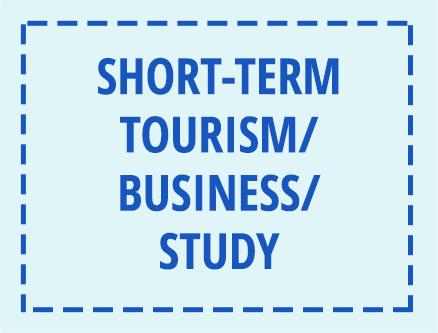
Application drop-off/pick-up & payment Hours
- No appointment required.
- No parking available.
- Please check our holidays before visiting.
- In case of adverse weather conditions, Embassy of Japan follows the guideline of U.S. Federal Government. When the U.S. Office of Personnel Management (OPM) announces federal agencies in the Washington, D.C. area are "closed" or "delayed", Embassy of Japan along with VISA section will be closed/delayed accordingly.
- The Embassy will NOT accept any applications by mail.
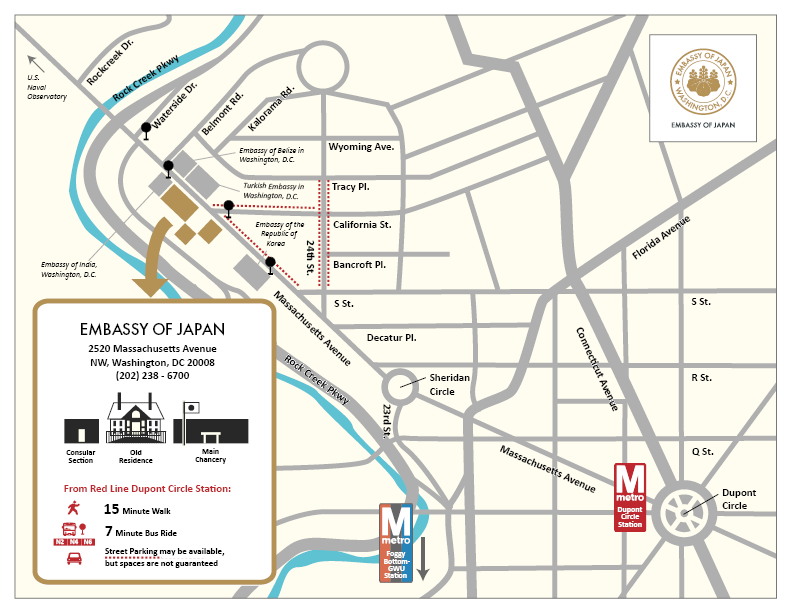
- US citizens are exempt from visa fees. (Some countries and regions are also exempt from visa fees. Please check the Visa Fee Exempt list to find out if your visa fee is waived. )
- Applicants who have applied for a visa online are required to bring a printed copy of “Registration Information Form” to the Embassy for your payment (payment is only acceptable in the afternoon). *Applicants who has applied for evisa (online visa) on or after 10th July are eligible for online payment ( Details / Video ).
- We accept CASH only. We DO NOT accept personal checks and credit cards.
Information on Border Measures
Covid-19 travel guidelines.
- On-arrival surveillance for travelers and returnees with COVID-19 symptoms has been conducted since 12:00 am (JST) on May 8, 2023.
- Insurance Before Entrance
- Guidebook for when you are feeling ill
Visiting Japan
- After April 29, 2023, pre-registration for quarantine procedures on Visit Japan Web are no longer required, however, you can still use Visit Japan Web to pre-register for "Immigration", "Customs" and "Tax-free Shopping Service" (Optional).
- For information about traveling with minor(s), please read our FAQ .

Staying in Japan
- Be aware of traffic rules in Japan
- Nice to Meet You! Let's Be Friends!
- Study in Japan
- Japanese pension law
- Information on Local Call Centers
- It is a CRIME to sell or give a bank account without just cause.
- Roadmap for the Realization of a Society of Harmonious Coexistence with Foreign Nationals
- Comprehensive Measures for Acceptance and Coexistence of Foreign Nationals
- A daily life support portal for foreign nationals
- Guidebook on Living and Working
- New to Japan? Useful pages for foreign nationals

Recommended Information
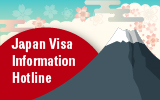
- Consular Section: Embassy of Japan, 2520 Massachusetts Ave. NW, Washington, DC 20008
- Office Hours: Application Drop-off/ M-F 9:15am-12:00pm Visa Pick-up/ M-F 1:30pm-4:00pm
- Contact Us: 202-238-6800/ M-F 9:00am-5:00pm
- Japan Visa Information Hotline (Available in English/Vietnamese/Russian/Ukrainian) 1-202-499-1468 Domestic call fee applies, 24hours, 7days/week
- Media & Industry
- Meetings & Events
- Select Language 简体中文 繁體中文(香港) 繁體中文(臺灣) India (English) Bahasa Indonesia 한국어 ภาษาไทย Tiếng Việt Singapore (English) Philippines (English) Malaysia (English) Australia/New Zealand (English) Français Deutsch Italiano Español United Kingdom (English) Nordic countries(English) Canada (English) Canada (Français) United States (English) Mexico (español) Português العربية Japan(日本語) Global (English)
- India (English)
- Bahasa Indonesia
- Singapore (English)
- Philippines (English)
- Malaysia (English)
- Australia/New Zealand (English)
- United Kingdom (English)
- Nordic countries(English)
- Canada (English)
- Canada (Français)
- United States (English)
- Mexico (español)
- Global (English)
- Fujiyoshida
- Shimonoseki
- Ishigaki Island
- Miyako Island
- Kerama Island
- Tokyo Island
- Koka & Shigaraki
- Hida Takayama
- Ginza, Nihonbashi
- Beppu & Yufuin (Onsen)
- Ginzan Onsen
- Nagasaki Islands

- Kumano Kodo
- Shikoku Karst
- Amami Oshima
- Hachimantai
- Omihachiman
- Aizuwakamatsu

- Diving in Japan
- Skiing in Japan
- Seasonal Flowers in Japan
- Sustainable Outdoors
- Off the Beaten Track in Japan
- Scenic Spots
- World Heritage
- Home Stays & Farm Stays

- Japanese Gardens
- Japanese Crafts
- Temple Stays
- Heritage Stays
- Festivals and Events
- Theater in Japan
- Japanese Tea Ceremony
- Cultural Experiences in Japan
- Culture in Japan

- Local Cuisine Eastern Japan
- Local Cuisine Western Japan
- Local Street Food
- Japan's Local Ekiben
- Japanese Whisky
- Vegetarian and Vegan Guide
- Sushi in Japan Guide
- Japanese Sake Breweries

- Art Museums
- Architecture
- Performing Arts
- Art Festivals
- Japanese Anime and Comics
- Japanese Ceramics
- Local Crafts

- Scenic Night Views
- Natural Wonders
- Theme Parks
- Samurai & Ninja
- Iconic Architecture

- Wellness Travel in Japan
- Japanese Ryokan Guide
- A Guide to Stargazing in Japan
- Relaxation in Japan
- Forest Bathing (Shinrin-yoku)

- Experiences in Japan
- Enjoy my Japan
- National Parks
- Japan's Local Treasures
- Japan Heritage
- Snow Like No Other
- Wonder Around Japan

- Visa Information
- Getting to Japan
- Airport Access
- COVID-19: Practical Information for Traveling to Japan
- Anime Tourism
- Countryside Stays
- Accessible Tourism
- Hokkaido Great Outdoors
- Scenic World Heritage in Tohoku
- Shikoku’s Nature and Traditions
- Southern Kyushu by Rail

- Traveling by Rail
- How to Travel by Train and Bus
- JR Rail Passes
- Scenic Railways
- Renting a Car
- Sustainable Travel in Japan
- Travel Brochures
- Useful Apps
- Online Reservation Sites
- Eco-friendly Accommodation
- Luxury Accommodations
- Traveling With a Disability
- Hands-free Travel
- How to Book a Certified Tour Guide
- Volunteer Guides
- Tourist Information Center

- Japanese Manners
- Spring in Japan
- Summer in Japan
- Autumn in Japan
- Winter in Japan
- Cherry Blossom Forecast
- Autumn Leaves Forecast

- Japan Visitor Hotline
- Travel Insurance in Japan
- Japan Safe Travel Information
- Accessibility in Japan
- Vegetarian Guide
- Muslim Travelers
- Safety Tips

- JAPAN Monthly Web Magazine
- Arts & Cultures
- Nature & Outdoor
- Festivals & Events
- Insider Blog
- Things to do
- Local Guides
- Food & drink
- Traditional
- Hokuriku Shinetsu

My Favorites
${v.desc | trunc(25)}
Planning a Trip to Japan?
Share your travel photos with us by hashtagging your images with #visitjapanjp
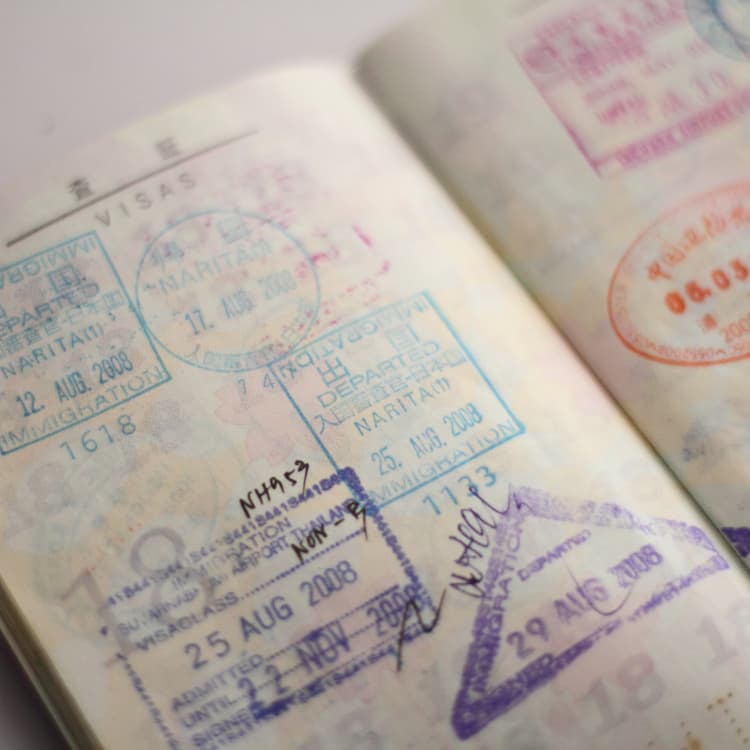
- Helping You Plan
All you need to know about entering, leaving and staying in Japan
Any foreign visitor entering Japan must have a valid passport for the duration of their stay, and all visitors must comply with the conditions of their visas.
See below for information about the current visa requirements for Japan.
If you have any further questions, please contact the Japanese embassy or consulate in your country of residence.
Did this information help you?
out of found this information helpful.
Thank you for your feedback.
Recommended for you.

Please Choose Your Language
Browse the JNTO site in one of multiple languages
Situation in Haiti April 5, 2024
U.s. citizens in haiti, update january 10, 2024, information for u.s. citizens in the middle east.
- Travel Advisories |
- Contact Us |
- MyTravelGov |
Find U.S. Embassies & Consulates
Travel.state.gov, congressional liaison, special issuance agency, u.s. passports, international travel, intercountry adoption, international parental child abduction, records and authentications, popular links, travel advisories, mytravelgov, stay connected, legal resources, legal information, info for u.s. law enforcement, replace or certify documents.
Before You Go
Learn About Your Destination
While Abroad
Emergencies
Share this page:
Travel Advisory January 8, 2024
Japan - level 1: exercise normal precautions.
Japan – Level 1: Exercise Normal Precautions
Reissued after periodic review without changes.
Exercise normal precautions in Japan.
Read the country information page for additional information on travel to Japan.
If you decide to travel to Japan:
- Enroll in the Smart Traveler Enrollment Program (STEP) to receive Alerts and make it easier to locate you in an emergency.
- Follow the Department of State on Facebook and Twitter .
- Follow Embassy Tokyo’s American Citizen Services section on Facebook and Twitter .
- Review the Country Security Report for Japan.
- Visit the CDC page for the latest Travel Health Information related to your travel.
- Prepare a contingency plan for emergency situations. Review the Traveler’s Checklist .
Embassy Messages
View Alerts and Messages Archive
Quick Facts
Duration of intended period of stay. Please note you cannot travel on a passport you have previously declared as lost or stolen even if you subsequently locate it
One page required for entry stamp
Amounts equivalent to ¥1,000,000 or above subject to declaration
Embassies and Consulates
U.S. Embassy Tokyo 1-10-5 Akasaka, Minato-ku, Tokyo 107-8420 Japan Telephone: 81-3-3224-5000 Emergency After-Hours Telephone: 81-3-3224-5000 Fax: 81-3-3224-5856 Our Navigator Assistant will guide you to the information you need.
U.S. Consulate General Osaka-Kobe 2-11-5, Nishitenma, Kita-ku, Osaka 530-8543, Japan Telephone: 81-6-6315-5900 Emergency After-Hours Telephone: 81-3-3224-5000 Fax: 81-6-6315-5914 Our Navigator Assistant will guide you to the information you need.
U.S. Consulate General Naha 2-1-1 Toyama, Urasoe City, Okinawa, Japan Telephone: 81-98-876-4211 Emergency Telephone: 81-3-3224-5000 Fax: 81-98-876-4243 Our Navigator Assistant will guide you to the information you need.
U.S. Consulate General Sapporo Kita 1-jo Nishi 28-chome, Chuo-ku, Sapporo 064-0821, Japan Telephone: 81-11-641-1115 Emergency After-Hours Telephone: 81-11-641-1115 Fax: 81-11-643-1283 Our Navigator Assistant will guide you to the information you need. All assistance at the Consulate General Sapporo is by appointment only.
U.S. Consulate Fukuoka 5-26 Ohori 2-chome, Chuo-ku, Fukuoka 810-0052, Japan Telephone: 81-92-751-9331 Emergency After-Hours Telephone: 81-3-3224-5000 Fax: 81-92-713-9222 [email protected] Our Navigator Assistant will guide you to the information you need. Routine services are provided by appointment only.
U.S. Consulate Nagoya Nagoya International Center Bldg. 6th floor, 1-47-1 Nagono, Nakamura-ku, Nagoya 450-0001, Japan Telephone: 81-52-581-4501 Emergency After-Hours Telephone: 81-3-3224-5000 Fax: 81-52-581-3190 Our Navigator Assistant will guide you to the information you need. Emergency services are provided by U.S. Consulate General Osaka-Kobe.
Destination Description
See the Department of State’s Fact Sheet on Japan for information on U.S-Japan relations.
Entry, Exit and Visa Requirements
Visit the Embassy of Japan website for the most current visa information.
There are no COVID-related entry requirements for U.S. citizens.
Entry & Exit:
- You must have a valid passport and an onward/return ticket for tourist/business "visa free" stays of up to 90 days. Your passport must be valid for the entire time you are staying in Japan.
- You cannot work on a 90-day "visa free" entry.
- "Visa free" entry status may not be changed to another visa status without departing and then re-entering Japan with the appropriate visa, such as a spouse, work, or study visa.
- Visit the Embassy of Japan website for the most current information on all visa categories.
- Japanese immigration officers may deny you entry if you appear to have no visible means of support.
- All foreign nationals are required to provide fingerprint scans and to be photographed at the port of entry. Exceptions to this requirement include diplomatic and official visa holders, minors, and individuals covered under SOFA Article IX.2. For further information about landing procedures, please visit the Immigration Bureau of Japan’s website .
- Make sure your passport is valid. Note you cannot travel on a passport you have previously declared as lost or stolen even if you subsequently locate it. Japanese authorities will likely deny you entry into Japan if you attempt to do so. If you have reported your passport lost or stolen, you must apply for a new passport before travel.
Transiting Japan:
- Ensure that your passport and visa are valid and up-to-date before you leave the United States. Passport services are not available at the airport.
- Airlines in Japan may deny you boarding for transit if you do not have the required travel documents for an onward destination in another country or if your passport does not have six months of validity remaining. For the entry requirements of the country you are traveling to, visit the State Department's Country Specific Information website.
Military/SOFA Travelers: While active-duty U.S. military personnel may enter Japan under the Status of Forces Agreement (SOFA) with proper Department of Defense (DoD) identification and travel orders, all SOFA family members, civilian employees, and contractors must have valid passports to enter Japan. Please consult the DOD Foreign Clearance Guide before leaving the United States.
See the Immigration Bureau of Japan’s website for various immigration procedures.
HIV/AIDS Restrictions: The U.S. Department of State is unaware of any HIV/AIDS entry restrictions for visitors to or foreign residents of Japan.
Find information on dual nationality , prevention of international child abduction and customs regulations on our websites.
Safety and Security
For police services in Japan, dial 110. For fire or ambulance services, dial 119.
Crime: Crime against U.S. citizens in Japan is generally low and usually involves personal disputes, theft, or vandalism. In addition:
- Robberies committed after a victim has been drugged from a spiked drink can occur, especially in nightlife districts.
- Sexual assaults are not often reported, but they do occur, and victims may be randomly targeted. Victim's assistance resources or shelters are difficult for foreigners to access.
- Hate-related violent crimes rarely occur, although some U.S. citizens have reported being the target of discrimination because of their nationality or their race.
- Pick pocketing can occur in crowded shopping areas, on trains, and at airports.
- Police reports must be filed before leaving Japan, as Japanese police will not accept reports filed from overseas.
- In instances involving credit card theft or fraud, Japanese police often provide a report number rather than a police report. You can provide this report number to your credit card company to confirm the incident with the police.
Entertainment and Nightlife Districts in Tokyo:
- Exercise caution in all entertainment and nightlife districts throughout Japan, especially Roppongi, Kabuki-cho, Shibuya, and Ikebukuro.
- Incidents involving U.S. citizens in these areas include physical and sexual assaults, drug overdoses, theft of purses, wallets, cash and credit cards at bars or clubs, and drugs slipped into drinks.
- Drink spiking at bars and entertainment venues, especially in areas such as Roppongi and Kabuki-cho, near Shinjuku, has led to robbery, physical and sexual assaults, and credit card fraud. Some victims regain consciousness in the bar or club; other victims may awaken on the street or other unfamiliar locations.
- U.S. citizens have reported being threatened with gun or knife violence in such venues so that they will pay exorbitant bar tabs or withdraw money. U.S. citizens have also reported being beaten when they have refused to pay or hand over money.
- There have been reports of U.S. citizens being forcibly taken to ATMs and robbed, or made to withdraw funds after being unable to pay exorbitant bar tabs.
- Please be aware that Roppongi, Kabuki-cho, and other entertainment and nightlife districts have also been the scenes of violence between criminal syndicates.
See the Department of State and the FBI pages for information on scams.
Police reports must be filed at the nearest police station prior to departure from Japan. The Japanese police cannot accept reports filed from overseas. Report crimes to the local police at 110 and contact the U.S. Embassy at 03-3224-5000 (011-81-3-3224-5000 from overseas). Remember that local authorities are responsible for investigating and prosecuting the crime.
See our webpage on help for U.S. victims of crime overseas .
- help you find appropriate medical care;
- assist you in reporting a crime to the police;
- contact relatives or friends with your written consent;
- explain the local criminal justice process in general terms;
- provide a list of local attorneys;
- provide information on victim’s compensation programs in the U.S. ;
- provide an emergency loan for repatriation to the United States and/or limited medical support in cases of destitution
- help you find accommodation and arrange flights home; and/or
- replace a stolen or lost passport.
Contacting Police, Fire and Ambulance Services: You can reach the police throughout Japan by dialing 110. Fire and ambulance services can be contacted by dialing 119. Note that English-speaking dispatchers may not be available. Please review advice on “Calling for Help” on our website . If you need assistance, you should be able to describe your address/location in Japanese or find someone who can do so, since few police officers speak English.
Domestic Violence: Victim's assistance resources or battered women's shelters exist in major urban areas, but are difficult for foreigners to access. These types of resources are also generally unavailable in rural areas. Investigations of sexual assault crimes are often conducted without female police officers present, and police typically ask about the victim's sexual history and previous relationships.
Tourism: The Victim's assistance resources or battered women's shelters exist in major urban areas, but are difficult for foreigners to access. These types of resources are also generally unavailable in rural areas. Investigations of sexual assault crimes are often conducted without female police officers present, and police typically ask about the victim's sexual history and previous relationships.
See our webpage for more information on insurance providers for overseas coverage.
Local Laws & Special Circumstances
Criminal Penalties: You are subject to Japanese law while you are in Japan. If you violate Japanese laws, even unknowingly, you may be arrested, imprisoned, or deported. If you are arrested in Japan, even for a minor offense , you may be held in detention without bail for several months or more during the investigation and legal proceedings.
Some offences are also prosecutable in the United States, regardless of Japanese law. For examples, see our website on crimes against minors abroad and the Department of Justice website.
The vast majority of arrests of U.S. citizens in Japan are for drug-related offenses. Japanese authorities aggressively pursue drug smugglers and users, including recreational users with sophisticated detection equipment, "sniffing" dogs, blood tests, “stop and frisk” tactics, and other methods. Penalties for possessing, using, or trafficking a drug that is illegal in Japan are severe, and convicted offenders can expect long jail sentences and fines. Please note that some drugs which may be legal in certain jurisdictions outside of Japan, including marijuana and synthetic drugs, remain illegal in Japan. This also applies to certain prescription drugs that doctors in the United States may prescribe. Japanese law makes no distinction between medical and recreational marijuana; therefore, having a prescription for medical marijuana will not help you avoid arrest or prosecution. Even possession of a small amount of marijuana for personal medical or recreational use can result in a long jail sentence and fine. Japanese customs officials carefully screen incoming packages, and individuals who are mailed drugs can be arrested and prosecuted as drug traffickers.
Confiscation of Prescription Drugs and Other Medication: It is important to note that some medications that are routinely prescribed in the United States, including Adderall and marijuana, are strictly prohibited in Japan. The Japanese government decides which medications may be imported legally into Japan. The Embassy and Consulates of Japan in the United States have limited information available and do not have a comprehensive list of specific medications or ingredients. Please see more information on importing medicines into Japan.
You must carry your U.S. passport or Japanese Residence Card (Zairyu Kado) with you at all times. In Japan, you may be taken in for questioning if you do not have your passport or Japanese residence card to show your identity and status in Japan (e.g., as a visitor, student, worker, or permanent resident).
It is illegal to work in Japan while in tourist or visa-waiver status. Overstaying your visa or working illegally may lead to fines of several thousands of dollars, and in some cases, re-entry bans as long as 10 years, or indefinitely for drug offenders. For additional information, please see Japan’s Immigration Control and Refugee Recognition Act and contact the Japanese Embassy or nearest Japanese Consulate in the United States for more information.
Driving under the influence of alcohol could also land you immediately in jail. The blood-alcohol limit in Japan is 0.03%. Punishments can be up to 10,000 USD in fines and up to five years in prison.
Possession of a gun or ammunition is a crime in Japan. Carrying a knife with a locking blade, or a folding blade that is longer than 5.5 cm (a little more than two inches), is illegal in Japan. U.S. citizens and U.S. military personnel have been arrested and detained for more than 10 days for carrying pocket knives that are legal in the United States but illegal in Japan. The possession of lock-picking tools is illegal in Japan.
Establishing a Business : Individuals establishing a business or practicing a profession that requires additional permits or licensing should seek information from the competent local authorities, prior to practicing or operating a business.
A list of English-speaking lawyers located throughout Japan is available on our website .
Arrest Notification : If you are arrested or detained, ask police or prison officials to notify the U.S. Embassy immediately. See the Department of State’s webpage and the Embassy’s website for additional information.
Counterfeit and Pirated Goods: Although counterfeit and pirated goods are prevalent in many countries, they may still be illegal according to local laws. You may also pay fines or have to give them up if you bring them back to the United States. See the U.S. Department of Justice’s website for more information .
Faith-Based Travelers: See our following webpages for details:
- Faith-Based Travel Information
- International Religious Freedom Report – see country reports
- Human Rights Report – see country reports
- Hajj Fact Sheet for Travelers
- Best Practices for Volunteering Abroad
LGBTQI+ Travelers: There are no legal restrictions on same-sex sexual relations or the organization of LGBTI+ events in Japan.
Laws governing rape, sexual commerce, and other activity involving sexual relations do not apply to same-sex sexual activity. This leads to lower penalties for perpetrators of same-sex rape and sexual assault and greater legal ambiguity surrounding same-sex prostitution.
See our LGBTQI+ Travel Information page and section 6 of our Human Rights report for further details.
Travelers with Disabilities: The law in Japan prohibits discrimination against persons with disabilities. Japanese disability laws require the public sector to provide reasonable accommodations and the private sector to make best efforts in employment, education, access to health care, or the provision of other services; however, there are no penalties for noncompliance. Social acceptance of persons with disabilities in public is not as prevalent as in the United States.
Although Japan’s accessibility laws mandate that new construction projects for public use include provisions for persons with disabilities, older buildings are not likely to have been retrofitted for accessibility. At major train stations, airports, and hotels, travelers with disabilities should encounter few accessibility problems. Note that many smaller stations are inaccessible to those who cannot climb stairs. Information on travel in Japan for travelers with disabilities is available at Accessible Japan .
Travelers with disabilities can learn more about resources available in country from the Japan National Tourism Organization’s traveling with a disability page .
Students: See our Students Abroad page and FBI travel tips .
Women Travelers: See our travel tips for Women Travelers .
Conditions at Prisons and Detention Facilities: Japanese prisons and detention facilities maintain internal order through a regime of very strict discipline. U.S. citizen prisoners often complain of stark, austere living conditions and psychological isolation. Heating in winter can be inadequate in some facilities, food portions can be significantly smaller than what many may be accustomed to, and access to specialized medical care, particularly mental health care, at detention facilities and prisons is sometimes limited. Additional information on arrests in Japan is available on our embassy website.
Customs Regulations: Please contact the Japanese Embassy or nearest Japanese consulate in the United States, or visit the Japanese Customs website for specific information regarding import restrictions and customs requirements.
Japanese customs authorities encourage the use of an Admission Temporaire/Temporary Admission (ATA) Carnet in order to temporarily import professional equipment, commercial samples, and/or goods for exhibitions and trade fairs into Japan. For additional information, please call (212) 354-4480, or email the U.S. CIB for details.
Pets: The Japanese Animal Quarantine Service (AQS) sets procedures for importing pets. At a minimum, the process will take seven to eight months, though the process can take up to a year before a pet may enter Japan. Advance planning is critical. You can find more information about importing a pet into Japan or information about exporting a pet from Japan on our Embassy website.
Employment Issues: U.S. citizens should not come to Japan to work without having the proper employment visa arranged ahead of time. Teaching English, even privately, and serving as hosts/hostesses are both considered "work" in Japan and are illegal without the proper visa.
Some U.S.-based employment agencies and Japanese employers do not fully or correctly represent the true nature of employment terms and conditions. A minimum requirement for effectively seeking the protection of Japanese labor law is a written and signed work contract. If there is no signed contract, Japanese authorities are not able to act on behalf of foreign workers. If you are coming to Japan to work, carefully review your contract and the history and reputation of your Japanese employer before traveling to Japan. Complaints against U.S.-based employment agencies or recruiters may be directed to the Better Business Bureau or the Office of the Attorney General in the relevant state(s).
Disaster Preparedness : Japan is prone to natural disasters, including earthquakes, typhoons, tsunamis, and landslides. See the Embassy’s webpage for recommendations and steps you can take to prepare for an emergency. The Japan Tourism Organization’s Safety Tips app and NHK World app provide Japanese government emergency “J-Alerts” to your cell phone in English through push notifications. “J-Alerts” can provide early warning emergency alerts on earthquakes predicted in a specific area, sometimes seconds before an earthquake hits.
Radiation: Fukushima Daiichi Nuclear Power Plant : The Government of Japan continues to closely monitor the conditions at and around the Fukushima Daiichi Nuclear Power Plant. You should comply with all travel restrictions and cautions put into place by the Government of Japan for areas surrounding the plant. For more information, contact the Japan Nuclear Regulation Authority .
For police service in Japan, dial 110. For fire or ambulance, dial 119.
Ambulance services are widely available but receiving hospitals may decline to accept inbound patients unless they can provide proof of funds to pay for services.
COVID-19 Testing:
- Travelers should contact Japanese local health providers to determine the location of testing facilities within Japan. A non-comprehensive list of some COVID-19 testing facilities can be found here on the Embassy website.
COVID-19 Vaccines:
- The COVID-19 vaccine is available for U.S. citizens to receive in Japan.
- Review the Government of Japan’s English language website on COVID-19 vaccinations in Japan.
- Visit the FDA's website to learn more about FDA-approved vaccines in the United States.
The Department of State does not pay medical bills. Be aware that U.S. Medicare/Medicaid does not apply overseas. Most hospitals and doctors overseas do not accept U.S. health insurance.
Medical Insurance: Make sure your health insurance plan provides coverage overseas. Some care providers in Japan only accept cash payments. See our webpage for more information on insurance providers for overseas coverage. Visit the U.S. Centers for Disease Control and Prevention for more information on type of insurance you should consider before you travel overseas.
We strongly recommend supplemental insurance to cover medical evacuation.
If traveling with prescription medication, check with the government of Japan’s Ministry of Health website to ensure the medication is legal in Japan; possession, use, or importation of a prescription drug that is illegal in Japan may result in arrest and criminal prosecution. Always carry your prescription medication in original packaging with your doctor’s prescription. U.S. prescriptions are not honored in Japan, so if you need ongoing prescription medicine, you should arrive with a sufficient supply for your stay in Japan or enough until you are able to see a local care provider.
Vaccinations: Be up-to-date on all vaccinations recommended by the U.S. Centers for Disease Control and Prevention.
Further health information:
- World Health Organization
- U.S. Centers for Disease Control and Prevention (CDC)
Japan has a national health insurance system which is available only to those foreigners with long-term visas for Japan. National health insurance does not pay for medical evacuation. Medical caregivers in Japan may require payment in full at the time of treatment or concrete proof of ability to pay before they will treat a foreigner who is not a member of the national health insurance plan.
U.S.-style and standard psychological and psychiatric care can be difficult to locate outside of major urban centers in Japan and generally is not available outside of Japan's major cities. Extended psychiatric care can be very difficult to obtain.
Air Quality: Visit AirNow Department of State for information on air quality at U.S. Embassies and Consulates.
Travel and Transportation
Road Conditions and Safety : Driving in Japan can be complicated and expensive. Traffic moves on the left side of the road. Those who cannot read the language will have trouble understanding road signs. Highway tolls can be very high, and city traffic is often very congested. A 20-mile trip in the Tokyo area may take two hours. There is virtually no legal roadside or curbside parking; however, traffic is commonly blocked or partially blocked by those illegally parked curbside. In mountainous areas, roads are often closed during the winter, and cars should be equipped with tire chains. Roads in Japan are much narrower than those in the United States.
Traffic Laws : Japanese law provides that all drivers in Japan are held liable in the event of an accident, and assesses fault in an accident on all parties. Japanese compulsory insurance (JCI) is mandatory for all automobile owners and drivers in Japan. Most short-term visitors choose not to drive in Japan. Turning right or left on red lights is not permitted in Japan, and all passengers are required to fasten their seat belts.
Japan has a national 0.03 percent blood-alcohol-level standard for driving, and drivers stopped for driving under the influence of intoxicants will have their licenses confiscated. If you are found guilty of driving under the influence, speeding, or blatantly careless driving resulting in injury, you are subject to up to 15 years in prison.
See our Road Safety page for more information. The National Police Agency (NPA) oversees the administration and enforcement of traffic laws in Japan. You can find further information in English on the NPA English website . Information about roadside assistance, rules of the road, and obtaining a Japanese driver's license is available in English from the Japan Automobile Federation (JAF) web site . See the Japan National Tourism Organization’s website for car rental and driving in Japan.
Emergency Assistance : For roadside assistance, please contact the Japan Automobile Federation (JAF) at 03-5730-0111 in Tokyo, 072-645-0111 in Osaka, 011-857-8139 in Sapporo, 092-841-5000 in Fukuoka, or 098-877-9163 in Okinawa.
International Driving Permits (IDPs): An international driving permit (IDP) issued in the United States by the American Automobile Association (AAA) or the American Automobile Touring Alliance (AATA) is required of short-term visitors who drive in Japan. You must obtain an IDP issued in your country of residence prior to arriving in Japan. The U.S. Embassy andU.S. consulates do not issue IDPs. IDPs issued via the Internet and/or by other organizations are not valid in Japan.
Foreign residents in Japan who use an IDP may be fined or arrested. In practice, the term “resident” involves more than simply visa status or length of stay in Japan and is determined by the police. In short, a driver license from country outside Japan is not a substitute for a valid Japanese license for foreign residents. See the U.S. Embassy’s website for more information on driving in Japan.
Aviation Safety Oversight : The U.S. Federal Aviation Administration (FAA) has assessed the government of Japan’s Civil Aviation Authority as being in compliance with International Civil Aviation Organization (ICAO) aviation safety standards for oversight of Japan’s air carrier operations. Further information may be found on the FAA's safety assessment page .
Maritime Travel : Mariners planning travel to Japan should also check for U.S. maritime advisories and alerts in the Alerts section of the Embassy’s messages. Information may also be posted to the U.S. Coast Guard homeport website , and the National Geospatial-Intelligence Agency (NGA) broadcast warnings website portal select “broadcast warnings.”
For additional travel information
- Enroll in the Smart Traveler Enrollment Program (STEP) to receive security messages and make it easier to locate you in an emergency.
- Call us in Washington, D.C. at 1-888-407-4747 (toll-free in the United States and Canada) or 1-202-501-4444 (from all other countries) from 8:00 a.m. to 8:00 p.m., Eastern Standard Time, Monday through Friday (except U.S. federal holidays).
- See the State Department’s travel website for the Worldwide Caution and Travel Advisories .
- Follow us on Twitter and Facebook .
- See traveling safely abroad for useful travel tips.
Review information about International Parental Child Abduction in Japan . For additional IPCA-related information, please see the International Child Abduction Prevention and Return Act ( ICAPRA ) report.
Travel Advisory Levels
Assistance for u.s. citizens, learn about your destination, enroll in step.

Subscribe to get up-to-date safety and security information and help us reach you in an emergency abroad.
Recommended Web Browsers: Microsoft Edge or Google Chrome.
Make two copies of all of your travel documents in case of emergency, and leave one with a trusted friend or relative.
Afghanistan
Antigua and Barbuda
Bonaire, Sint Eustatius, and Saba
Bosnia and Herzegovina
British Virgin Islands
Burkina Faso
Burma (Myanmar)
Cayman Islands
Central African Republic
Cote d Ivoire
Curaçao
Czech Republic
Democratic Republic of the Congo
Dominican Republic
El Salvador
Equatorial Guinea
Eswatini (Swaziland)
Falkland Islands
France (includes Monaco)
French Guiana
French Polynesia
French West Indies
Guadeloupe, Martinique, Saint Martin, and Saint Barthélemy (French West Indies)
Guinea-Bissau
Isle of Man
Israel, The West Bank and Gaza
Liechtenstein
Marshall Islands
Netherlands
New Caledonia
New Zealand
North Korea (Democratic People's Republic of Korea)
Papua New Guinea
Philippines
Republic of North Macedonia
Republic of the Congo
Saint Kitts and Nevis
Saint Lucia
Saint Vincent and the Grenadines
Sao Tome and Principe
Saudi Arabia
Sierra Leone
Sint Maarten
Solomon Islands
South Africa
South Korea
South Sudan
Switzerland
The Bahamas
Timor-Leste
Trinidad and Tobago
Turkmenistan
Turks and Caicos Islands
United Arab Emirates
United Kingdom
Vatican City (Holy See)
External Link
You are about to leave travel.state.gov for an external website that is not maintained by the U.S. Department of State.
Links to external websites are provided as a convenience and should not be construed as an endorsement by the U.S. Department of State of the views or products contained therein. If you wish to remain on travel.state.gov, click the "cancel" message.
You are about to visit:
What you need to know about Japan visa requirements

Dec 24, 2023 • 3 min read
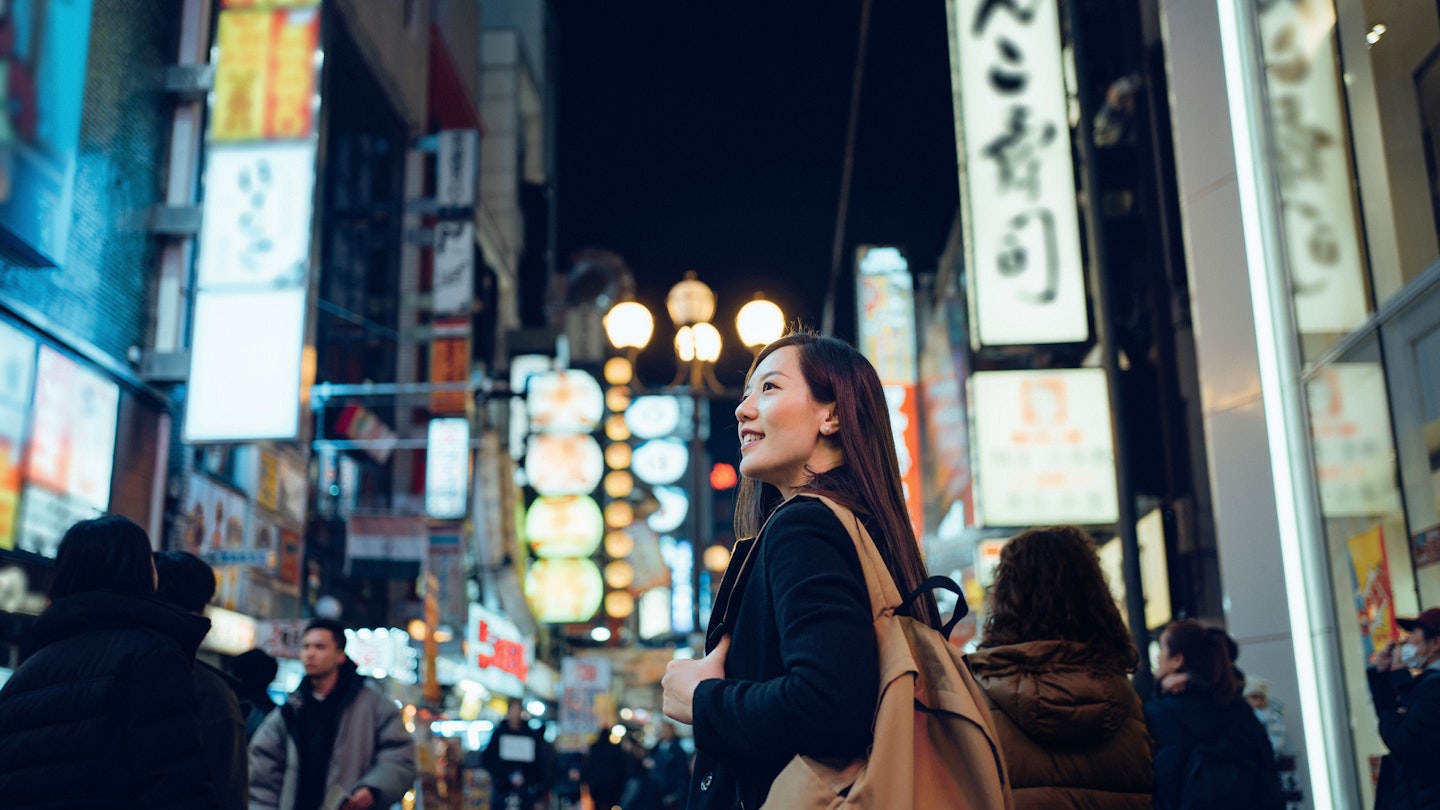
Visitors from 68 countries can travel to Japan with a free visa on arrival © d3sign / Shutterstock
With its pulsing, modern cities, beautiful rural landscapes and world-renowned cuisine, Japan is one of the top stops for travelers seeking a fully immersive Asian experience. And there's good news: travelers dreaming of a long-awaited trip to Japan need wait no longer – after establishing some of the world’s strictest border control policies during COVID-19, Japan has opened visa-free travel for visitors from most countries.
Read on for a rundown of Japan’s latest entry requirements, and consult Japan’s Ministry of Foreign Affairs website for the most up-to-date information ahead of your travels.
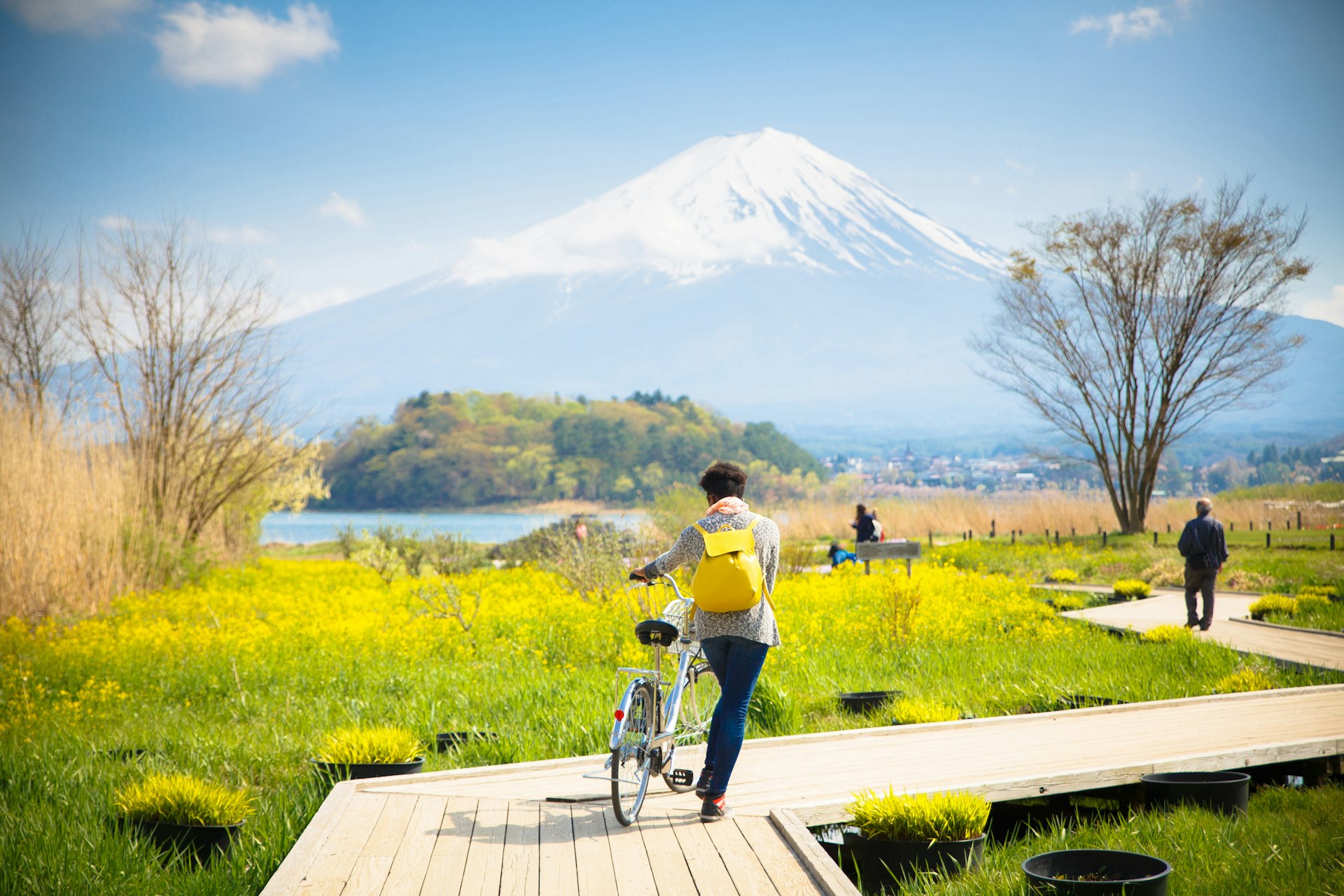
Entry procedures – before you arrive
Ahead of your trip, register at Visit Japan Web , where you can submit your documentation for customs and immigration, and then download your QR code to your smartphone.
When you arrive in Japan, simply show the QR code when requested during the entry process.
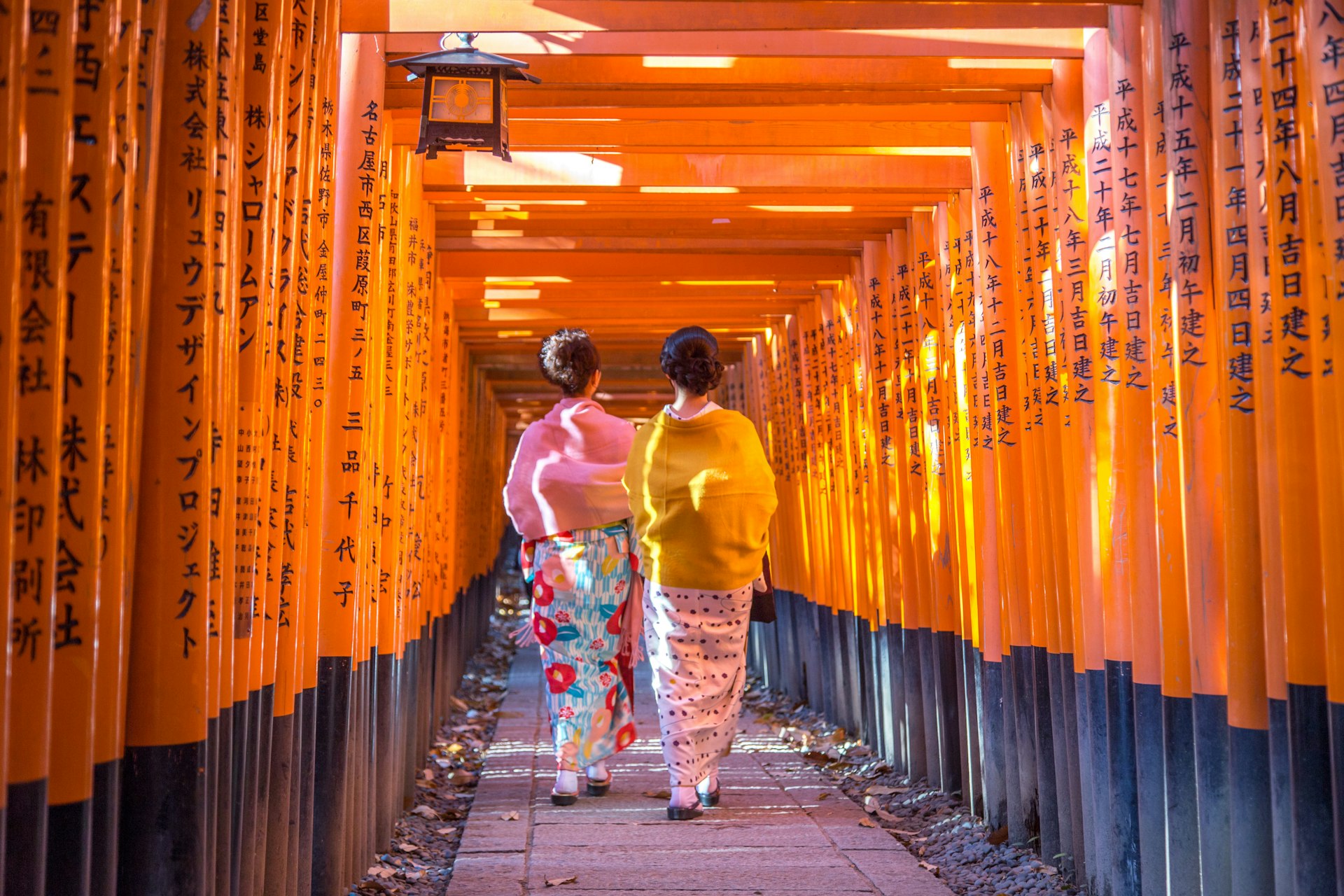
How to get a visa
Residents of 68 countries can enter Japan for up to 90 days for tourism purposes with a free visa upon arrival; this is considered a visa exemption. These countries include the UK, USA, Canada, Mexico, Australia, Singapore, Malaysia and most countries in Europe. For a complete list of visa-exempt countries and visa durations, consult the Japanese Ministry of Foreign Affairs .
On entering Japan, all holders of foreign passports are photographed and fingerprinted. If asked, travelers arriving with a visa upon arrival should be able to provide proof of onward travel or sufficient means to purchase an air or ferry ticket out of Japan. In practice, this is rarely requested. Your passport should also be valid for the proposed duration of your stay.
Travelers not from a visa-exempt country will need to apply for one via their nearest Japanese embassy in their home nation or organize one with an accredited travel agent approved by the Japanese Embassy. The cost of visas is approximately 3,000 yen for a single-entry visa and 6,000 yen for a double- or multiple-entry visa. Fees are collected in the currency of the country in which the embassy is located.
The processing period for visas is five business days from the day after the acceptance of the application. For more information about the requirements of applying for a Japanese visa in specific countries, see the Japanese Ministry of Foreign Affairs website.

What if I need to extend my visa?
Extending a visa is possible from within Japan for citizens of Austria, Germany, Ireland, Lichtenstein, Mexico, Switzerland and the UK; these travelers may be able to extend their temporary visitor visa once, for another 90 days. Visitors wishing to do this will need to apply at a regional immigration bureau in Japan before the initial visa expires. If approved, the extension fee is 4,000 yen.
For other nationalities, extending a temporary visa is difficult unless you have family or business contacts in Japan who can act as a guarantor on your behalf. Options should be discussed at your nearest regional immigration bureau.
Longer, working visas are also available to visitors of Japan, which allow people to study, train or work in the country. These usually grant entry for either three years, one year, six months or three months. These visas must be applied for in advance of travel, via an embassy in your country of origin.
There is also a specific working holiday visa , which allows visitors to engage in small-scale employment while visiting the country for tourism purposes. These are available to people between the ages of 18 to 30 (25 in some cases) from 26 countries including Australia, New Zealand, Canada, Korea, the UK and a number of countries in Europe. The number of hours that can be worked and the type of work permitted are limited under this visa.
This article was first published March 2021 and updated December 2023
Explore related stories

Destination Practicalities
Mar 31, 2024 • 7 min read
Be ready for a visit to Japan with these tips on health, safety and etiquette.

Mar 28, 2024 • 7 min read

Mar 28, 2024 • 6 min read

Mar 26, 2024 • 8 min read

Mar 25, 2024 • 6 min read

Feb 9, 2024 • 9 min read

Jan 31, 2024 • 6 min read

Dec 11, 2023 • 6 min read

Dec 10, 2023 • 6 min read
Temporary Visitor Visa
Who can use a temporary visitor visa, temporary visitors for business.
(1) The visa application form (see Documentation #1 below). (2) A valid passport (see Documentation #2 below). (3) A photo (see Documentation #3 below). (4) A certificate of completion of registration for the ERFS.
Additional documents may be requested.
Temporary Visitors Visiting Relatives or Acquaintances (*) *Only those who are deemed to have a relationship equivalent to relatives (betrothed or common-law marriage) or those who are deemed to have a need to visit Japan (to attend a wedding or funeral or to visit an acquaintance who is ill).
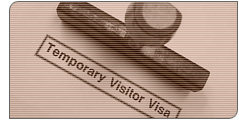
Visa Exemption
U.S. citizens and citizens of other countries which have a reciprocal visa exemption arrangement with Japan may be eligible to visit Japan without a visa for a short-term stay for the activities allowed to Temporary Visitors. For more information about reciprocal visa exemption arrangements, please click here . Important Notice :Border enforcement measures to prevent the spread of novel coronavirus (COVID-19)
Documentation
Please be aware that we will decline applications that have incomplete documents. Each Temporary Visitor Visa applicant must submit the following documents: * Consulate General of Japan will not make copies. If you need original documents, please bring the original plus one copy.
- An application form completed and signed. Blank forms are available at Japanese consular offices. You can also download by clicking on visa application form ( Sample ) in PDF format. Chinese citizens must write their names in Chinese characters, as well as in Roman letters. Korean citizens in principle are asked to write their names in Chinese characters, as well as in Roman letters. Please include your e-mail address and contact phone information. An applicant with an arrest or criminal record must provide a copy of his/her court and/or arrest record (including cases that ended with an acquittal or pardon), along with an English translation of those documents if they are in any language other than English. Even if the case did not go to trial, please provide a letter that explains in detail the circumstances surrounding the arrest. We would like to know about the charges, time served, fees paid, and probation (if any).
- Valid passport ( original plus one photo copy of the face page) with sufficient space for a visa (This means at least one empty, blank visa page. US passports use the rear pages for amendments, and are not acceptable as blank visa pages ). If you already have a valid Japanese visa in your passport, please include a signed consent form as shown in the sample at this link: http://www.ny.us.emb-japan.go.jp/en/d/Consent.pdf . If you submit a PERMIT TO REENTER THE UNITED STATES or a REFUGEE TRAVEL DOCUMENT issued by the U.S. government, it must have a validity date at least six months beyond the date of visa application.
- A passport-sized photograph: 2-inch x 1.4-inch photograph on glossy photo paper taken within the last six months with plain background. Photograph may be attached to the application form with glue (not tape or staples) or you may submit the photograph unattached.
- Green Card or valid I-94 and U.S. resident visa to re-enter the United States (F or J visa holder must show an I-20 or DS-2019 with the valid signature of an appropriate official in order for re-entry). If you will be entering a third country after leaving Japan, you must show a valid visa to enter that country (or a national passport of that country). We ask that all applicants submit their original immigration documents (green card, I-20, etc.) or a NOTARIZED copy of the documents. * Please note: In principle we do not accept an application from B-1 and B-2 U.S. visa status holders.
- A confirmed reservation record of your round-trip flight to/from Japan. An e-ticket or print-out from a travel agency, airline or travel website is acceptable. The print-out should include: -Your name. -Your confirmation number/record locator. -Your airlines, flights and all departure and destination cities. -Your complete round-trip flight itinerary, starting and ending in the US. This should include all of the countries you are visiting other than Japan, if applicable. * Please note: We do not require the purchase of tickets, but we do require a confirmed reservation. We are not responsible for tickets which may be unusable due to the delay or denial of a visa. For those with non-revenue ticket holders: a) Actual Non-Revenue ticket (original plus copy of all pages), plus a printed entire flight information from the airline company b) A copy of the employee ID of the airline employee who obtained the flight coupon, or a letter from the airline proving the employee works for the airline, and that the applicant is authorized to use the non-revenue ticket
- If traveling for BUSINESS, original letter from applicant’s company signed by an authorized executive officer, on company letterhead, stating: a) applicant’s position in the company, duration of employment, and monthly or annual salary b) nature/purpose of visit in detail c) dates/duration of stay intended d) contact person, company name, address and phone number of business contact in Japan e) guarantee of financial support during applicant’s stay in Japan and return transportation from Japan * Additional documents may be requested during the course of examination.
- If going to attend a CONFERENCE, conference brochures plus a paid registration form and invitation will be required. In addition, a letter from the home institution/company giving the circumstances of the trip as in 6.a ) ~ 6.c ) from the visa applicant’s home institution/company, plus the applicant’s financial resources such as listed on 8.a) will be required.
Visa Fees Visa fees are determined according to reciprocal arrangements between Japan and the country of the applicant's nationality. Click here for Visa Fees.
Processing Time Please refer to our introduction page .
Applications by mail Please refer to our introduction page .
Note for Chinese nationals In general, Japanese Embassy/Consulates in China are not accepting Japanese tourist visa applications from Chinese nationals residing in other countries, and if you are planning to sightsee in Japan during your temporary stay in China or on the way back to the US, we recommend applying for a Japanese visa before leaving the US.
Note for Nationals of India Click here for outline of application procedures for Multiple Entry VISA ( English / Japanese )
Note for Nationals of Indonesia, the Philippines, and Vietnam Click here for outline of application procedures for Multiple Entry VISA ( English / Japanese )
Visa Traveler
Exploring the world one country at a time
Japan Tourist Visa: Requirements and Application Process
Published: March 18, 2024
A Japanese tourist visa is required for all non-visa-exempt nationalities and those who are not eligible for eVisa. Japan tourist visa application can only be lodged in person at a Japanese embassy in your country of nationality or residence.
Quick summary:
- Who requires it: Foreign nationals that are not visa-exempt
- Validity: 3 months, single-entry
- Allowed stay: up to 90 days
- Extensions: not allowed
- Processing time: 5 business days
- Fee: 3000 JPY or less
Read the Japan Visa Guide for more general advice about available visas for tourists, eligibility, and procedures.
Table of Contents
Understanding japan tourist visa.
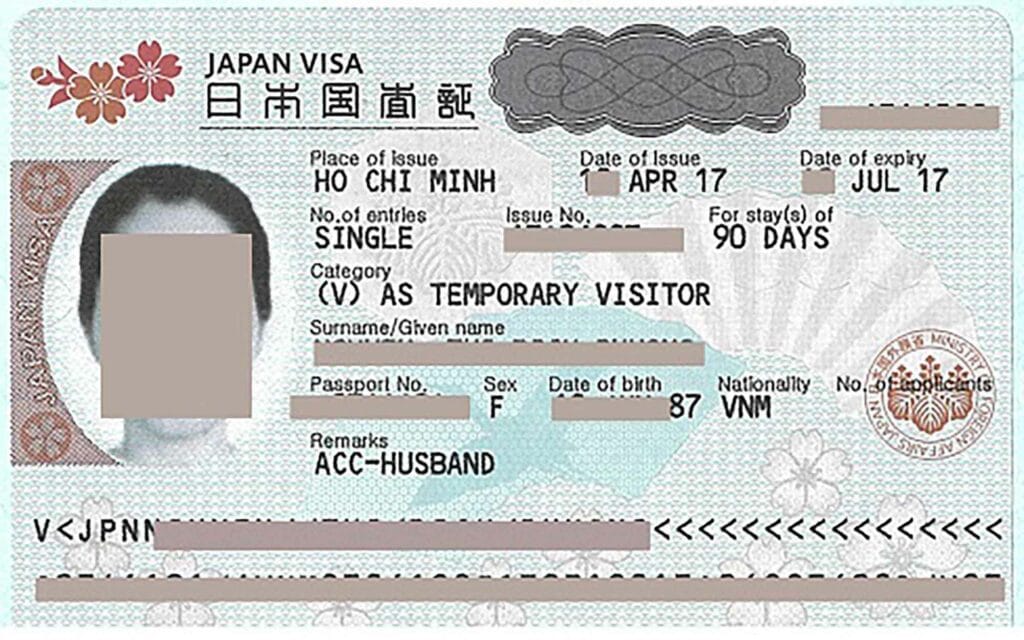
Tourist visa validity
Japan single entry visa is valid for 3 months. You cannot extend this period of validity and if you change your passport before you use it, you must apply for a new visa.
Duration of stay
In most cases, the duration of allowed stay inside Japan is 90 days. In some cases, it can be lower, about 15 or 30 days.
Allowed number of entries
The standard Japanese tourist visa is a single entry only.
Multiple entry tourist visas are also issued but only to select nationalities with additional requirements.
Allowed ports of entry
With a Japanese tourist visa, you can enter Japan at any international airport or seaport.
When to apply
The processing time is 5 business days after the visa application is deemed complete by the receiving embassy. This can in turn take a few extra days or even up to 2 weeks.
It can take even longer if additional documents are requested from you or your application is sent for further review. Apply well in advance to ensure you receive the visa before your travel dates.
- Earliest : 3 months before traveling
- Latest : 2 weeks before traveling
Tourist visa extension
Extensions are not possible for either visa validity or allowed duration of stay.
Benefits of Japan tourist visa
Japan tourist visa offers VISA-FREE access to 14 countries. Read the VISA-FREE countries for Japan visa for more details.
Japan Tourist Visa Requirements
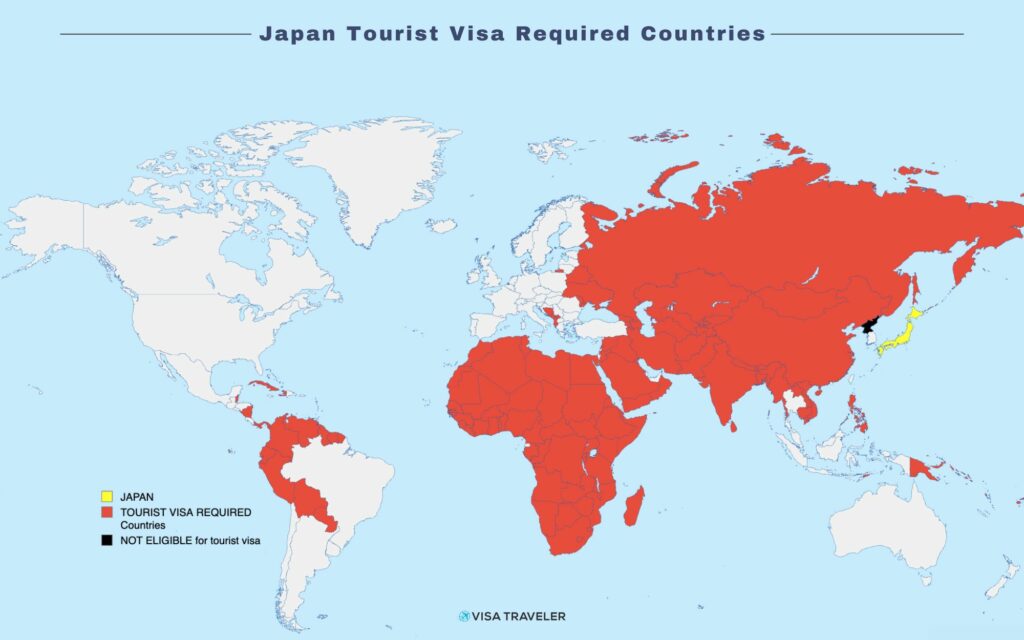
Who requires a tourist visa
The following nationalities require a tourist visa to travel to Japan
- Nationalities that are NOT visa-exempt (currently, 70 countries are visa-exempt)
- Nationals that are NOT eligible for Japan eVisa (currently, nationals and residents of 14 countries are eligible for eVisa)
North Korean nationals are not eligible for Japanese visas and are always denied entry.
Documents required
The following are the required documents for a Japan single entry visa for individual tourists (not on organized tours through travel agencies):
- Passport valid for the duration of stay
- One passport-size photo
- Completed Visa Application Form (use Adobe Acrobat Reader to fill out the Visa application form digitally, then print it and stick the passport photo)
- Confirmation of reservation of tickets (air or sea) both to and from Japan OR Information about the planned schedule of flight or cruise, including entry and departure dates both to and from Japan
- Proof of sufficient funds – certificate of income or tax statement AND bank statement
- Travel Itinerary plus any tickets or leaflets supporting your travel plans
The documents may vary depending on the receiving embassy and you may be requested to submit additional ones.
NOTE There are minor differences in the required documents for independent tourists from China, Russia, CIS countries, Georgia, and the Philippines. These are listed below.
Chinese travelers
Generally, Chinese tourists visiting Japan come on tours organized by authorized travel agencies.
As an independent Chinese traveler, it is possible to obtain a tourist visa for Japan if you have sufficient financial capability.
You must prepare your own travel itinerary in advance and approach an approved Chinese travel agency to facilitate and lodge the visa application for you. There is currently no way to apply at a Japanese embassy in China independently.
The period of stay granted for tourist visas to Chinese nationals is usually 15 or 30 days.
Travelers from Russia, CIS Countries, and Georgia
Independent tourists from any of the CIS (Commonwealth of Independent States) countries, Russia, or Georgia traveling to Japan, can obtain a single-entry visa.
The required documents are more or less the same as for other countries but you must submit 2 Visa Application Forms and 2 photos.
Travelers from the Philippines
In addition to the general document requirements, you must also submit:
- Birth certificate issued by the National Statistics Office (PSA) on security paper. If the certificate is illegible, crumpled, or parts of it are missing, also submit a birth certificate from the local government.
- Marriage certificate (if married)
Photo requirements
The passport photo must meet the following requirements.
- Taken within the last 6 months
- Must be of size 45mm x 35mm
- In color against a plain white background
- Taken looking straight forward and face visible clearly
- On a good quality paper
Tourist visa fee
The fee for the Japan tourist visa is 3000 JPY payable in the local currency of the embassy where you apply.
Visa fees may be lower for some countries.
Online payment for the visa fee is not possible.
Crucially, you don’t need to pay the visa fees when you apply. You will pay only if your Japan visa is approved. Japan is one of the few countries in the world that charge visa application fees after the visa is issued and don’t charge for unsuccessful applications.
Processing time
The processing time is 5 business days.
However, this period starts after the embassy confirms that your application is complete which is known to take a few days or longer.
In reality, you can expect your visa to be issued within 2 weeks in most cases.
Japan Tourist Visa Application Process
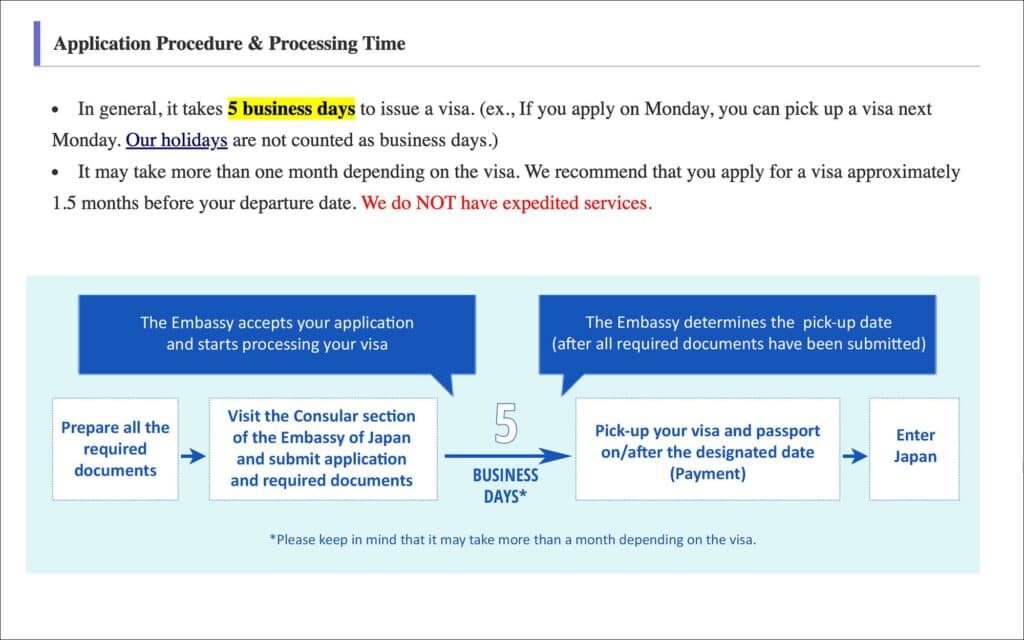
How to apply for a Japan tourist visa
You must apply at a Japanese Embassy or Consulate General with jurisdiction over the area where you live or the one with jurisdiction over the country in which your passport is issued.
Effectively, this means that you must apply in the embassy in your own country or the country where you are legally a resident .
If there is no Japanese embassy in your country, see which embassy nearby has jurisdiction over your country – it’s usually the closest one in a neighboring country. Check the Japanese embassies and consulates around the world.
Applying for Japan tourist visa at the embassy is usually a 5 step process.
Step 1: Gather all the necessary documents.
Step 2: Apply in person at the Japanese embassy.
Step 3: Remain available to reach – the embassy may request additional documents or an in-person interview.
Step 4: If your application is successful and your visa issued, go back to the embassy to collect your passport
Step 5: Pay the visa fee in cash in the local currency
If your application is rejected, you won’t be able to apply for a tourist visa again for the next 6 months unless there are major changes to your circumstances. There are no other penalties and there is no fee to be paid.
How to contact the Japanese embassy or consulate
Check the website of your Japanese embassy . They have methods of contact listed on their websites.
Alternatively, reach out to the Japan visa information hotline at [email protected] with your nationality or residence and inquiry.
Entry Procedure at the Border
Regardless of the border you enter Japan at, your flight origin, or your nationality, the entry procedure in Japan is pretty much always the same.
The border officer will check that you meet all requirements, including that your visa is valid, your purpose for entering Japan, and the planned length of your stay.
Assuming everything is in order, the officer will grant you “landing permission” by affixing a seal of verification for landing in your passport. At this point your visa expires and you are allowed to stay in Japan for up to 90 days (or as much as provided in your visa).
Frequently Asked Questions (FAQs)
Is japan visa easy to get.
The Japanese tourist visa is one of the easiest to obtain. There are relatively few required documents, no mandatory interviews, and a high success rate.
If you submit a complete and honest application, the chances of visa approval are high.
Can I apply for a Japan visa online?
Japan also has an eVisa system in place but it’s available only to certain travelers.
You can apply for a Japan visa online (eVisa) if you are a legal resident of Australia, Brazil, Cambodia, Canada, Saudi Arabia, Singapore, South Africa, Taiwan, UAE, the UK or the USA.
A legal resident can be anyone residing in those countries on a student visa, work visa, residence permit, etc.
What is the minimum bank balance for Japan tourist visa?
There is no official guideline for the minimum required bank balance but a rule of thumb is to have at least 100 USD for each day of intended stay in Japan.
For example, if you submit an itinerary for a 15-day trip to Japan, you should show a minimum of 1,500 USD balance in your bank account.
WRITTEN BY THIRUMAL MOTATI

Thirumal Motati is an expert in tourist visa matters. He has been traveling the world on tourist visas for more than a decade. With his expertise, he has obtained several tourist visas, including the most strenuous ones such as the US, UK, Canada, and Schengen, some of which were granted multiple times. He has also set foot inside US consulates on numerous occasions. Mr. Motati has uncovered the secrets to successful visa applications. His guidance has enabled countless individuals to obtain their visas and fulfill their travel dreams. His statements have been mentioned in publications like Yahoo, BBC, The Hindu, and Travel Zoo.
PLAN YOUR TRAVEL WITH VISA TRAVELER
I highly recommend using these websites to plan your trip. I use these websites myself to apply for my visas, book my flights and hotels and purchase my travel insurance.
01. Apply for your visa
Get a verifiable flight itinerary for your visa application from DummyTicket247 . DummyTicket247 is a flight search engine to search and book flight itineraries for visas instantly. These flight itineraries are guaranteed to be valid for 2 weeks and work for all visa applications.
02. Book your fight
Find the cheapest flight tickets using Skyscanner . Skyscanner includes all budget airlines and you are guaranteed to find the cheapest flight to your destination.
03. Book your hotel
Book your hotel from Booking.com . Booking.com has pretty much every hotel, hostel and guesthouse from every destination.
04. Get your onward ticket
If traveling on a one-way ticket, use BestOnwardTicket to get proof of onward ticket for just $12, valid for 48 hours.
05. Purchase your insurance
Purchase travel medical insurance for your trip from SafetyWing . Insurance from SafetyWing covers COVID-19 and also comes with a visa letter which you can use for your visas.
06. Get your zero-fee ATM card
You can manage money internationally in over 70 currencies using Wise . With a Wise card, you can store and withdraw cash in 40 currencies with zero ATM fees.
Need more? Check out my travel resources page for the best websites to plan your trip.
LEGAL DISCLAIMER We are not affiliated with immigration, embassies or governments of any country. The content in this article is for educational and general informational purposes only, and shall not be understood or construed as, visa, immigration or legal advice. Your use of information provided in this article is solely at your own risk and you expressly agree not to rely upon any information contained in this article as a substitute for professional visa or immigration advice. Under no circumstance shall be held liable or responsible for any errors or omissions in this article or for any damage you may suffer in respect to any actions taken or not taken based on any or all of the information in this article. Please refer to our full disclaimer for further information.
AFFILIATE DISCLOSURE This post may contain affiliate links, which means we may receive a commission, at no extra cost to you, if you make a purchase through a link. Please refer to our full disclosure for further information.
MORE VISA GUIDES

UNITED KINGDOM

VIEW ALL VISA GUIDES
- Cookie Policy
- Copyright Notice
- Privacy Policy
- Terms of Use
- Flight Itinerary
- Hotel Reservation
- Travel Insurance
- Onward Ticket
- Testimonials
Search this site
We’re sorry, this site is currently experiencing technical difficulties. Please try again in a few moments. Exception: request blocked
- Application
- Requirements
Japan Visa Requirements
Entry requirements for japan, choose your nationality.
Japan has visa exemption agreements with 68 countries . Travelers from several countries in Latin America, Africa, and Asia as well as many former Soviet Union nations are required to obtain a visa to Japan .
There are a few entry requirements for Japan that must be considered when planning a trip to the country.
Japan Entry Visa Requirements
Foreign visitors who need a visa to travel to Japan must meet the following Japan tourist visa requirements .
- A valid passport with at least 6 months validity and 2 blank pages
- A completed and signed visa application form
- A recent photograph , size 4.5 x 4.5 cm, in color and with a white background
- An official birth certificate or a certified copy
- If the traveler is married, it is necessary to submit a marriage certificate issued within one year
- Schedule and travel plans in Japan

Visitors who are required to apply for a Japan visa should verify that they meet all the necessary requirements . It is essential to have a valid passport and complete the visa application form with the details exactly as they are on the passport.
The period of time to stay in Japan is differs from 15 days to 90 days, depending on the nationality of the passport traveler. All the other travelers are required to visit the nearest Japanese diplomatic mission and apply for a visa before departure.
Citizens of the following countries are required a tourist visa for Japan:
- Central African Republic
- Cote D'Ivoire
- Congo, The Democratic Republic of the
- Marshall Islands
- Moldova, Republic of
- Palestinian Territory
- Russian Federation
- Saint Kitts and Nevis
- Saint Vincent and the Grenadines
- Solomon Islands
- Syrian Arab Republic
- Timor-Leste
Japan entry requirements for citizens from visa exempt countries require that travelers carry a passport, valid for at least the proposed duration of their stay.
Other Requirements to visit Japan
There are some additional Japan visa requirements that foreign travelers need to take into account when submitting their application at a Japanese mission.
Some travelers have a sponsor or guarantor that will support the Japan visa application. A sponsor is a person that, under the visa conditions, will cover the expenses of the person applying for a visa.
If the traveler does not have a sponsor or guarantor for their trip to Japan it is necessary to demonstrate that they can cover the expenses of their stay. In order to do this, it is necessary to submit the following:
- Bank certificate, issued within the last 3 months
- Applicant’s income tax return
In the case that the traveler has a sponsor or guarantor it is necessary to provide:
- Guarantee letter where the relation between the traveler and the sponsor is explained and the details of the sponsor or guarantor must be included
- Proof of relationship with the guarantor
- Bank certificated and income tax return of the sponsor/guarantor
For questions or inquires about how to apply for a tourist visa to Japan, it is advised to contact the Japanese embassy or consulate.
- Itineraries
- Tours and Activities
- Travel Guides
- Best of Japan
JRailPass.com » Japan Travel Blog » Japan Visa
Do I need a Visa for Japan? Japan Visa Policy
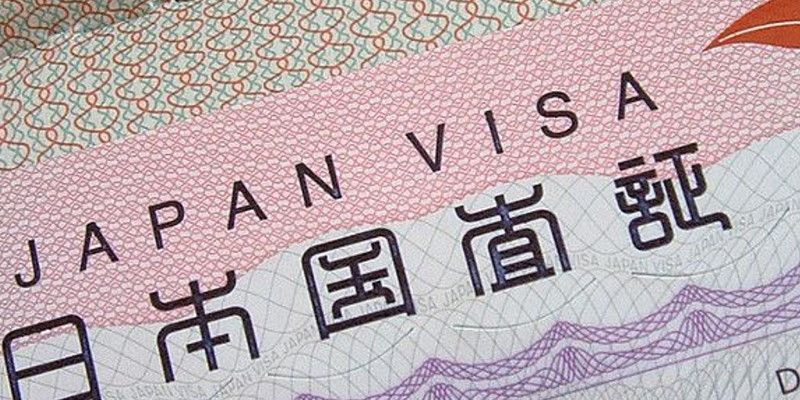
There are a number of different types of Japanese visas which are designed by the Japanese government for different purposes and lengths of time.
There are over 60 countries whose citizens can enter visa-free for tourism or business. Other nationalities currently need to go to a Japanese embassy or consulate to apply for a visa.
Japan introduced an eVisa for citizens of the US and Canada in 2022 that simplified the application process to acquire a Japan visa during pandemic visa suspensions.
Canadians and Americans no longer need a visa for Japan for short stays, but the eVisa is expected to launch for other visa-required nationalities in the near future.

Japan visa types
There are several types of visas for Japan and more will be introduced in the future, including the eVisa.
Visas are obtained directly from Japanese embassies and consulates, although the application process for the eVisa will be completed entirely online.
Japanese visas can be grouped in 3 main categories :
Working visa
Non-working visa.
- Family Related Visas
Working visas are considered long-term stay visas and cover the kind of work that requires high-level professional knowledge or skills and ‘thus, they do not include simple labor tasks. Jobs like waiter, construction workers, sales people, etc. cannot obtain a working visa. Typical working visas:
- Engineer, Specialist in Humanities, International Services Engineer. Engineers and Specialists in Humanities must have a university degree in their corresponding fields or 10 years of professional experience. International Services Engineers must have 3 years of professional experience in their field.
- Intra-company Transferee. This status applies to expats of foreign companies or the subsidiary companies of Japanese firms located overseas who have worked more than one year in the said office in overseas.
- Skilled Labor. Jobs involving foreign cooking, architecture, or civil engineering characteristic to foreign countries, training animals, instructing sports, sommeliers, processing precious stones will fall into this status. It’s mandatory to have at least 3 years of professional experience in the field.
- Business Manager. Those who are going to start a business or invest into a business in Japan. It also applies to those managing business on behalf of investors.
- Highly-Skilled Professional. This visa aims to attract workers who are likely to contribute to the Japanese economy.
Those with a certain status, knowledge, or skills can get the following working visas:
- Diplomats or Officials, Personnel of the embassies and consular offices, Diplomatic missions, Government personnel and their families.
- Research and education at university or equivalent educational institutions.
- Instruction of foreign languages or other education at elementary schools, high schools, etc. Those instructors looking to work in private language schools must apply for the Specialist in Humanities / International Services visa.
- For those whose artistic activities provide enough income to support their living in Japan.
- Religious activities. Missionaries sent to Japan from foreign religious organizations.
- Those journalists who have signed contracts with foreign media organizations. It includes freelance journalists.
- Legal and Accounting services.
- Medical Services. Medical specialists with Japanese qualifications.
- For those researchers working under a contract with public or private organizations in Japan.
- All of those working in show business and sports.
Anyone who holds a non-working visa is allowed to work as long as the immigration office grants them permission. This type of visas is considered a short-term stay visa and some restrictions apply. Those doing some work under a non-working visa cannot exceed the number of authorized hours per week.
Who can benefit:
- The visa application is submitted through the school.
- Those training to acquire technology, skills or knowledge. This status is granted only when the candidate will work in a job requiring that technology, skills or knowledge once he returns to his home country.
- Technical Internships. That covers internships after training under trainee visa.
- Spouses or children of people staying in Japan under the work visa and non-working visa (except for temporary visitors and trainees).
- Cultural Activities. Cultural or artistic activities with no income.
- Students or researchers of Japanese cultural or artistic activities.
- University students taking part in an internship without remuneration.
- Temporary Visitors (also known as Tourist visa ). This status includes visitors on vacation, sports, family visits, participants in seminars and conferences, business meetings, market research, and those traveling to Japan to engage in PR activities.
There is also another epigraphe for non-working visas that is granted case by case: Designated Activities. Students on internship, working holidays, diplomats’ housekeepers are some of the people who can apply for this visa.
Family related visas
Family related visas are considered short-term stay visas and have no retrictions when it comes to employment, so you can engage in more than one activity or change jobs. Those who can apply to these visas are:
- Spouses and children of Japanese nationals
- Long Term Residents
- Permanent Residents
- Spouses and children of Permanent Resident
Japan tourist visa
Any tourist wanting to visit Japan must obtain a tourist visa prior to entering the country. Nonetheless, Japan excludes several nationalities from having to comply with this requirement.
For instance, citizens from most European countries, United States, Australia, and Argentina do not need to get the Japan Tourist Visa since they are considered visa-exempt countries for tourism purposes. Nationals from any of those regions can stay in Japan for a maximum of 90 days visa-free and are assigned Temporary Visitor status.
Japan tourist visa is a short-term stay visa for the purposes of sightseeing, visiting friends, or attending conferences or courses . A tourist visa is normally valid for a single-entry stay of up to 90 days.
Tourists can also apply for a double-entry visa for 2 short trips within a 6-month period. It is important to note that the Japan tourist visa does not allow travelers to engage in paid work while in the country.
Other short-term stay visas
- Business visa: There is a temporary business visa for stays of up to 90 days which can single or double-entry visa (if both trips are within a 6-month period). Business purposes include conferences, meetings, signing contracts, and market surveys.
- Transit visa: Some nationalities need a transit visa to stop over in Japan when going to an onward destination. Many travelers do not need this as long as they stay within the allocated zone and do not leave the airport.
Which countries need a tourist visa?
All nationalities who are not visa-exempt need a visa to enter Japan. Citizens of certain countries can enter with Temporary Visitor status for limited periods of time ( 15 to 90 consecutive days ) for tourism or business purposes.
Visitors receive a stamp in their passport which is a requirement for the Japan Rail Pass . The rules are very strict and it is not possible to get the pass without showing the stamp (tourists with other types of visas are not eligible for the Pass).
The following nationalities are eligible for Temporary Visitor status (all others need a visa to enter):
The nationalities listed above can enter for tourism , visiting relatives, and business purposes. However, visitors cannot be paid for work under Temporary Visitor status. In these cases, it is necessary to obtain a work visa .
Citizens of the following countries will need a Japan tourist visa in order to enter Japan:
- Philippines
- CIS countries and Georgia
Book your Japan Rail Pass now
Japan tourist visa requirements
To successfully apply for a tourist visa for Japan, applicants must meet the following visa requirements :
- Hold a valid passport with at least 6 months remaining and 2 blank pages
- A completed visa application form
- Provide a recent color passport photo and a certified copy of your birth certificate
- If married, submit a marriage certificate (if issued within the last year)
- You must have the intention to leave Japan at the end of your authorized stay
- Proof of financial ability demonstrating you can support yourself financially during your stay in Japan
- Provide a certificate of your financial situation for the previous 6 months issued by your bank
- Submit the applicant’s tax return
- If applying without a sponsor, a copy of your Certificate of Employment must be submitted
- Provide a schedule and travel plans for the trip
If you still have questions about what you need in order to obtain the Japan tourist visa, you can find out more by checking the Japan entry requirements FAQ.
Japan tourist visa validity
Single-entry visas are valid for 3 months upon issue and usually allow you to stay in the country for up to 90 days. It is not possible to extend its validity.
Double-entry visas have a validity of 6 months from the date of issue.
Multiple-entry visas are usually good for a period of 1 to 5 years, depending on the visitor’s nationality, the purpose of the visit, and the type of passport they hold. Multiple-entry visas allow you to visit Japan multiple times within this period of 1 to 5 years since the issuing date, but each stay cannot exceed the 15 or 30-day period.
Japan tourist visa fees
A fee must be paid in order to obtain your Japan tourist visa. These fees vary depending on whether you are applying for a single-entry visa, a double-entry or a multiple-entry visa, as well as on the nationality of the tourist.
It is a good idea to check with your Japanese embassy or consulate before submitting your application since fees are subject to change at any time. Also, please note fees are collected in the local currency where the embassy or consulate is located and must be paid at the time of submitting your application. Once that has been done, you will receive proof of payment.
Japan Tourist eVisa
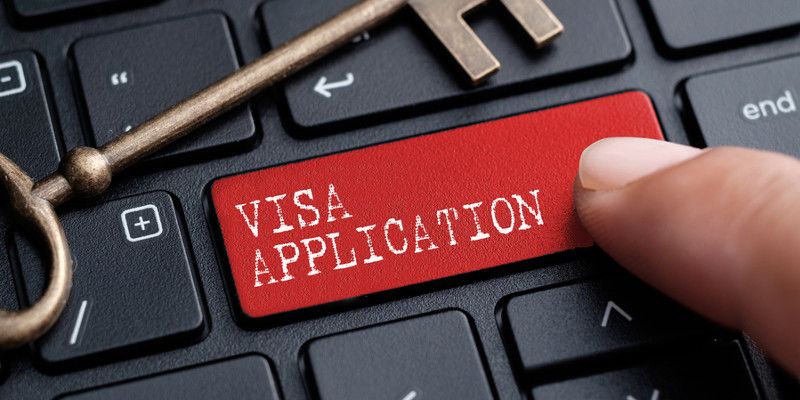
A Japan Tourist eVisa launched in August 2022 as part of the government’s wider plan to reach 60 million foreign visitors a year by 2030.
The eVisa for Japan was available for Canadians and US citizens, but these nationalities are now once again able to enter Japan visa-free. However, it may it is expected to launch for other nationalities in the future.
The online application form will be straightforward to complete and means that tourists do not need to go to an embassy or consulate to complete the application. It has been designed to simplify the visa application process.
It will be necessary to make a payment by credit or debit card to submit the application. Once an application has been submitted and approved , the eVisa approval notice will be sent to applicants by email.
More information: https://www.mofa.go.jp/j_info/visit/visa/index.html
Related Tours & Activities
Visa Requirements For Americans Traveling To Japan
- Last updated Apr 01, 2024
- Difficulty Beginner
- Category Travel
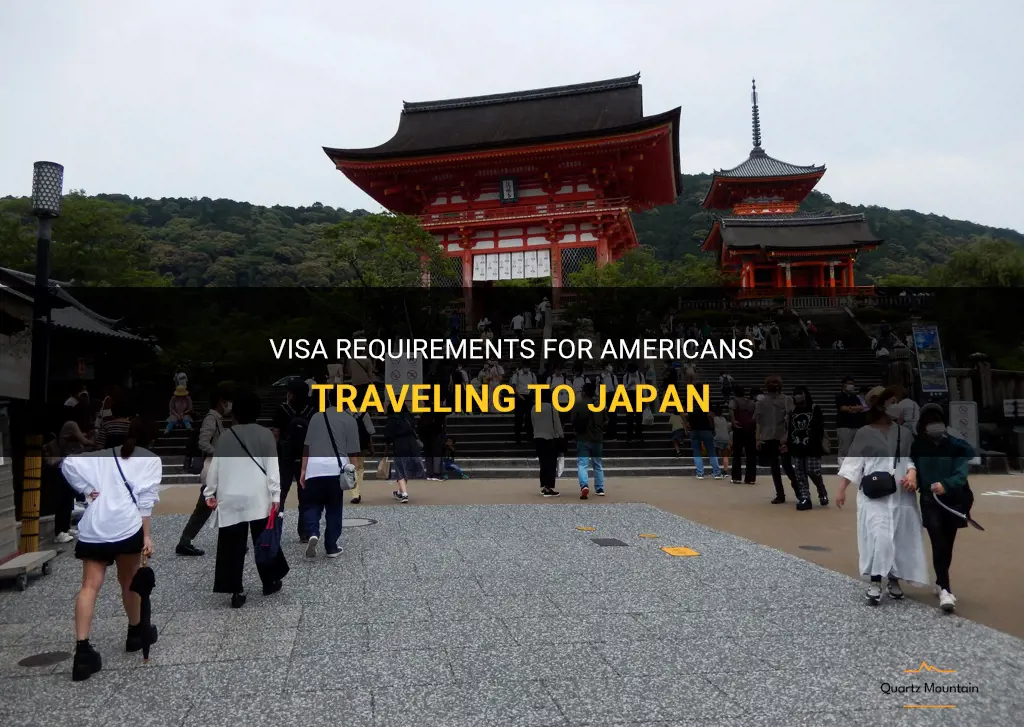
Planning a trip to Japan? One thing you'll want to get sorted before you board the plane is your visa requirements. As an American traveler, it's important to understand what type of visa you'll need in order to enter Japan legally and enjoy your time in this captivating country. Whether you're visiting for a vacation, business, or to study, this guide will break down the necessary visa requirements for Americans traveling to Japan, so you can focus on soaking up the rich culture and breathtaking landscapes that await you.
What You'll Learn
Do americans require visas to travel to japan, what is the process for americans to obtain a visa for travel to japan, are there any specific requirements or restrictions for americans traveling to japan on a visa, how long does it usually take for americans to receive a visa for travel to japan, is there a fee associated with obtaining a visa for americans traveling to japan.

Japan is a popular tourist destination for Americans with its rich culture, fascinating traditions, and beautiful landmarks. If you are an American planning to visit Japan, you might be wondering whether you need a visa to enter the country or if you can simply travel there visa-free.
The answer to this question depends on the purpose and duration of your stay in Japan. Generally, American citizens are allowed to travel to Japan without a visa for tourism, business, or visiting friends and relatives for a period of up to 90 days. This visa-free entry is granted under the Visa Waiver Program (VWP), which allows citizens from certain countries to enter Japan for short-term stays without obtaining a visa beforehand.
To qualify for entry under the VWP, you need to meet specific requirements. First, your passport must be valid for the entire duration of your stay in Japan and you should have a return or onward ticket. You also need to have enough funds to support yourself during your stay and no criminal record that would make you inadmissible to Japan. It's important to note that the visa-free stay cannot be extended, so if you plan to stay in Japan for more than 90 days, you will need to apply for a visa before your trip.
If your purpose of visit falls outside the scope of tourism, business, or visiting friends and relatives, you will likely need to obtain a visa prior to your travel. Examples of such purposes include studying, working, or engaging in paid activities in Japan. In these cases, it is recommended to consult the nearest Japanese embassy or consulate to obtain the appropriate visa type based on your specific needs and circumstances.
It is important to remember that visa requirements may change over time, so it's always a good idea to check the official website of the Japanese embassy or consulate in your country for the most up-to-date information. Additionally, it's wise to familiarize yourself with the entry requirements and immigration policies of any country you plan to visit to ensure a smooth and hassle-free travel experience.
In conclusion, American citizens traveling to Japan for tourism, business, or visiting friends and relatives can enter the country without a visa for up to 90 days under the Visa Waiver Program. However, for other purposes such as studying or working, a visa is required. It is crucial to stay informed about the current visa requirements and follow the guidelines provided by the Japanese embassy or consulate to avoid any complications during your trip.
Exploring London: Navigating the City with an Expired US Visa
You may want to see also
Traveling to a foreign country can be an exciting experience, but it does require some planning and preparation. If you are an American planning to visit Japan, one important step to consider is obtaining a visa. Here is a step-by-step guide to help you understand the process for Americans to obtain a visa for travel to Japan.
- Determining the Type of Visa: The first step in obtaining a visa for travel to Japan is to determine the type of visa you need. There are various types of visas available for different purposes such as tourism, business, study, or work. Visit the website of the Embassy of Japan in the United States to find out which visa category applies to your travel purpose.
- Gathering Required Documents: Once you have determined the type of visa you need, you will need to gather the required documents. Common documents include a valid passport, visa application form, a recent passport-size photograph, proof of travel itinerary, financial documents, and supporting documents specific to your travel purpose. Be sure to check the embassy's website for the specific requirements.
- Completing the Visa Application Form: The next step is to complete the visa application form accurately and honestly. The application form can usually be obtained from the embassy's website or in person at the embassy or consulate. Fill out the form with your personal details, travel information, and other necessary information. Double-check the form for any errors before submitting it.
- Submitting the Application: After completing the visa application form and gathering the required documents, you will need to submit them to the Embassy of Japan or one of its consulates. This can usually be done through mail or in person. It is advisable to submit your application well in advance of your planned travel dates to allow sufficient time for processing.
- Paying the Visa Fee: Along with your visa application, you will need to pay a non-refundable visa processing fee. The fee amount varies depending on the type of visa you are applying for. Check the embassy's website for the current fee schedule. Payments are usually accepted in the form of a money order or cashier's check made payable to the Embassy of Japan.
- Attending an Interview (if applicable): In some cases, applicants may be required to attend an interview at the embassy or consulate. This is usually the case for certain visa categories such as work or study visas. If you are selected for an interview, be sure to dress appropriately and bring any additional supporting documents that may be requested.
- Waiting for the Visa Approval: After submitting your visa application, you will need to wait for the embassy to process it. The processing time can vary depending on the embassy's workload and the time of year. It is highly recommended to apply for your visa well in advance to avoid any last-minute delays or complications.
- Collecting the Visa: Once your visa is approved, you will need to collect it from the embassy or consulate. You may be required to present your passport and a copy of the visa approval notification. Make sure to carefully check the visa for any errors or discrepancies. If everything is in order, you can proceed with your travel plans to Japan.
It is important to note that this guide provides a general overview of the visa application process for Americans traveling to Japan. Visa requirements and processes can vary from one country to another and may be subject to change. Therefore, it is always recommended to consult the official website of the Embassy of Japan in the United States or contact them directly for the most up-to-date and accurate information. Planning your visa application well in advance and being prepared with all the necessary documents will ensure a smooth and hassle-free travel experience to Japan.
Exploring the Republic of Ireland: Navigating Travel Requirements with a Schengen Visa
Traveling to Japan can be an exciting adventure, but before you pack your bags, it's important to understand the specific requirements and restrictions that may apply to Americans traveling to Japan on a visa. Whether you're traveling for tourism, business, or to study, there are certain guidelines you need to follow to ensure a smooth journey.
First and foremost, Americans traveling to Japan on a visa need to possess a valid passport. The passport must be valid for the entire duration of your stay in Japan, so it's crucial to check its expiration date before you make any travel plans. Additionally, your passport should have at least one blank page for the entry stamp that will be issued upon your arrival in Japan.
Depending on the purpose of your stay, you may need to apply for a visa before traveling to Japan. Generally, US citizens traveling for tourism or business purposes can stay in Japan for up to 90 days without a visa. However, if you plan to study, work, or engage in any other activities that go beyond the scope of a tourist or business visit, you will need to apply for the appropriate visa in advance. The application process usually involves submitting necessary documents, such as a valid passport, visa application form, and supporting documents related to your purpose of visit.
It's important to note that even if you are eligible for visa-free entry, you still need to fulfill certain requirements upon arrival in Japan. This includes providing a valid return or onward ticket, proof of sufficient funds to cover your stay, and a completed immigration form. Additionally, you may be subject to a biometric screening, which involves providing your fingerprints and having your photo taken.
While Americans traveling with a valid visa or visa-free entry may generally enjoy their stay in Japan, it's essential to be aware of certain restrictions. For example, you should adhere to immigration laws and regulations, not engaging in any activities that are prohibited under the terms of your visa or visa-free status. It's also important to respect local customs and cultural norms, as Japan has a unique set of social etiquette that may differ from what you're used to.
Finally, it's crucial to have appropriate travel and medical insurance coverage when traveling to Japan. This will protect you in case of unexpected events, such as illnesses, accidents, or travel disruptions. It's recommended to check the details of your insurance policy to ensure that it covers your specific needs and provides adequate coverage for your entire stay in Japan.
In conclusion, Americans traveling to Japan on a visa should be aware of the specific requirements and restrictions that apply to them. This includes having a valid passport, potentially applying for a visa before traveling, fulfilling entry requirements upon arrival, and adhering to immigration laws and regulations. By following these guidelines and being mindful of local customs, Americans can have an enjoyable and hassle-free experience while exploring the wonders of Japan.
Exploring the World: Are You Allowed to Travel on an F1 Visa?
Traveling to Japan can be an exciting and enriching experience. However, before Americans can embark on their journey, they may need to obtain a visa. The visa application process can be complex and time-consuming, so it's important for travelers to plan ahead and understand the expected timeline.
The length of time it takes for Americans to receive a visa for travel to Japan can vary depending on several factors, including the type of visa they are applying for and the individual circumstances of their application. However, there are some general guidelines that can help give travelers an idea of what to expect.
In general, the visa application process for travel to Japan can take anywhere from a few days to several weeks. It is recommended that travelers begin the process at least one month in advance of their planned departure date to allow for any unforeseen delays or complications.
The first step in obtaining a visa for travel to Japan is to determine the type of visa required. Americans traveling for tourism or business purposes typically need a short-term stay visa, also known as a temporary visitor visa. This visa allows for a stay of up to 90 days and is relatively straightforward to obtain.
To apply for a short-term stay visa, travelers will need to submit a completed visa application form, a valid passport, a recent passport-sized photograph, documentation of their travel itinerary, and proof of financial means to support their stay in Japan. They will also need to provide a letter of guarantee from a Japanese national or a resident of Japan who can vouch for their character and purpose of travel.
Once the application has been submitted, it will be reviewed by the Japanese consulate or embassy in the United States. The processing time can vary depending on the volume of applications and the time of year. During busy travel seasons, such as summer and the end-of-year holidays, it may take longer for applications to be processed.
After the application has been reviewed, the traveler will be notified of the decision. If the application is approved, the visa will typically be affixed to a page in the traveler's passport. In some cases, the traveler may be required to pick up their passport in person at the consulate or embassy.
Overall, it is important for Americans planning to travel to Japan to allow ample time for the visa application process. Starting the process at least one month in advance and ensuring that all required documentation is complete and accurate can help minimize delays and ensure a smooth travel experience.
For travelers in need of a visa for travel to Japan, it is a good idea to consult with the Japanese consulate or embassy in the United States for specific information and guidance. They can provide the most up-to-date information on visa requirements and processing times.
In conclusion, the length of time it takes for Americans to receive a visa for travel to Japan can vary depending on several factors. It is recommended that travelers start the process at least one month in advance and ensure that all required documentation is complete and accurate. By planning ahead and allowing for potential delays, travelers can help ensure a smooth and successful visa application process.
Is it Possible to Travel to China on a Tourist Visa?
When planning a trip to Japan, one of the important factors to consider is whether or not there is a fee associated with obtaining a visa for Americans. It's understandable that travelers want to know what costs to expect and plan accordingly. In this article, we will answer this question and provide some information about the visa application process.
Firstly, it is important to note that not all Americans traveling to Japan require a visa. Japan allows visa-free entry for citizens of certain countries, including the United States. Americans can enter Japan for tourism purposes and stay for up to 90 days without a visa. This is known as the visa exemption program.
However, there are certain situations where Americans may need to obtain a visa to enter Japan. These include purposes such as work, study, or staying in Japan for more than 90 days. In these cases, there is indeed a fee associated with the visa application process.
The visa application fee for Americans traveling to Japan varies based on the type of visa being applied for. As of the time of writing this article, the fee for a single-entry visa for short-term stay (up to 90 days) is $68. This fee may change over time, so it's essential to check with the Japanese embassy or consulate for the most up-to-date information.
Aside from the visa application fee, there may be additional costs involved in the visa application process. These can include fees for document processing, visa photographs, and other administrative costs. It's essential to factor in these additional expenses when budgeting for your trip to Japan.
The visa application process for Americans traveling to Japan involves several steps. Firstly, applicants need to gather the necessary documents, including a valid passport, a completed visa application form, and supporting documents depending on the purpose of the visit. These supporting documents may include a letter of invitation, proof of employment or enrollment, and financial statements.
Once the documents are prepared, applicants need to submit them to the nearest Japanese embassy or consulate. It's advisable to make an appointment in advance to ensure a smooth and efficient application process. After submitting the documents, applicants will be required to pay the visa application fee if necessary.
The processing time for visa applications can vary, but it typically takes around four to seven days for a decision to be made. Once approved, the visa will be attached to the applicant's passport, allowing them entry into Japan.
In conclusion, for Americans traveling to Japan for tourism purposes, there is generally no fee associated with obtaining a visa, as they can enter the country visa-free for up to 90 days. However, for other purposes such as work, study, or longer stays, there is a fee associated with the visa application process. It is essential to check the current visa application fee and any additional costs with the Japanese embassy or consulate before traveling to Japan. By being well-informed about the visa requirements and associated fees, travelers can plan their trip accordingly and avoid any unexpected expenses.
Understanding the Visa Requirements for Traveling to Norway
Frequently asked questions.
No, Americans do not require visas for tourist stays of up to 90 days in Japan. They can enter Japan under the Visa Waiver Program (VWP) as long as their passport is valid for the duration of their stay.
Americans can stay in Japan without a visa for up to 90 days. This applies to both business and tourist trips. If they wish to stay for longer than 90 days or engage in activities other than tourism or business, they will need to apply for the appropriate visa before their trip.
No, Americans cannot work in Japan without a visa. The visa exemption only applies to short-term visits for tourism or business purposes. If an American wants to work in Japan, they will need to apply for a work visa through their prospective employer before traveling to Japan.
No, Americans cannot extend their stay beyond 90 days without a visa. Regardless of the reason for the extension, Americans must leave Japan before their 90-day stay is up. If they wish to stay longer, they will need to apply for the appropriate visa through the Japanese embassy or consulate before their initial 90-day stay expires.

- Annie Rangel Author Editor Reviewer

- Melissa Carey Author Reviewer Traveller
It is awesome. Thank you for your feedback!
We are sorry. Plesae let us know what went wrong?
We will update our content. Thank you for your feedback!
Leave a comment
Travel photos, related posts.
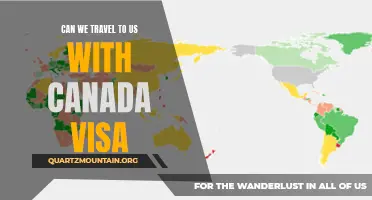
Exploring the Possibility of Traveling to the US with a Canadian Visa
- Mar 26, 2024

Exploring Puerto Rico: Can F1 Visa Holders Travel to the Island?
- Mar 22, 2024
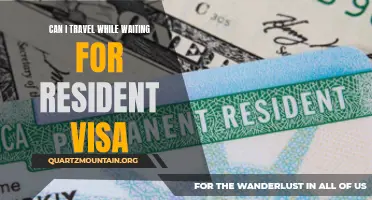
Exploring the World While Awaiting a Resident Visa: What You Need to Know
- Mar 23, 2024

Can Someone Travel with a U Visa? A Guide to Traveling Restrictions
- Mar 24, 2024
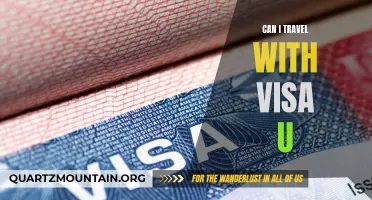
Is it possible to travel with a Visa U?
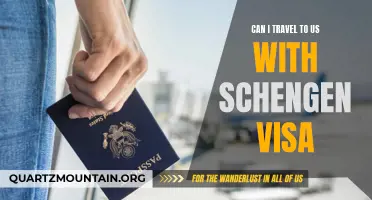
Traveling to the US with a Schengen Visa: Here's What You Need to Know
Cookies on GOV.UK
We use some essential cookies to make this website work.
We’d like to set additional cookies to understand how you use GOV.UK, remember your settings and improve government services.
We also use cookies set by other sites to help us deliver content from their services.
You have accepted additional cookies. You can change your cookie settings at any time.
You have rejected additional cookies. You can change your cookie settings at any time.
- Passports, travel and living abroad
- Travel abroad
- Foreign travel advice
Entry requirements
This advice reflects the UK government’s understanding of current rules for people travelling on a full ‘British citizen’ passport from the UK, for the most common types of travel.
The authorities in Japan set and enforce entry rules. If you’re not sure how these requirements apply to you, contact the Japanese Embassy in the UK .
COVID-19 rules
There are no COVID-19 testing or vaccination requirements for travellers entering Japan.
Travel in Japan
There are no official COVID-19 restrictions on travel, dining out or other activities. However, the Japanese government still recommends social distancing, mask wearing and other basic precautions. Public compliance with these recommendations is high.
Passport validity requirements
If you’re visiting Japan, your passport must be valid for the length of your stay. No additional period of validity is required.
Check with your travel provider that your passport and other travel documents meet requirements. Renew your passport if you need to.
You will be denied entry if you do not have a valid travel document or try to use a passport that has been reported lost or stolen.
Visa requirements
If you have a ‘British citizen’ passport, you can travel to Japan for tourism or business for up to 90 days. You will get a visa in your passport on arrival, and you do not need to apply before you travel. The Japanese immigration authorities may extend your visa by another 90 days at their discretion. You will need to apply for an extension.
If you have another type of British passport, you must get a visa.
To stay longer (to work or study, for or for other reasons), you must meet the Japanese government’s entry requirements. Check which type of visa or work permit you need with the Japanese Embassy in the UK .
It is illegal to work in Japan without the correct visa however informal or temporary the work.
If you overstay your permission to remain in Japan, you risk arrest, detention and a heavy fine.
For residency information, see the Japanese Immigration Services Agency website and living in Japan .
Vaccination requirements
At least 8 weeks before your trip, check the vaccinations and certificates you need in TravelHealthPro’s Japan guide .
Customs rules
There are strict rules about goods you can take into or out of Japan . You must declare anything that may be prohibited or subject to tax or duty.
It is illegal to bring meat products (including sausages, bacon and ham) to Japan without permission from the Japanese Animal Quarantine Service . Penalties include a heavy fine and prison sentence.
Whale meat is available in Japan but importing it into the UK and EU is illegal. If you import whale meat to the UK, you can get a fine of up to £5,000 and a prison sentence. Customs officers will seize the meat.
Taking money into Japan
People mainly use cash in Japan.
You may have difficulty using credit and debit cards issued outside Japan. Cirrus, Maestro, Link and Delta cash cards are not widely accepted. Japanese post offices, 7-Eleven stores and JP Post Bank have cash machines that will accept some foreign cards during business hours.
Check with your bank before travelling and take alternative sources of money.
Related content
Is this page useful.
- Yes this page is useful
- No this page is not useful
Help us improve GOV.UK
Don’t include personal or financial information like your National Insurance number or credit card details.
To help us improve GOV.UK, we’d like to know more about your visit today. We’ll send you a link to a feedback form. It will take only 2 minutes to fill in. Don’t worry we won’t send you spam or share your email address with anyone.

TIPS: What you need to know about getting a Japan visa
Planning to travel to Japan any time soon?
Applying for a visa can be daunting, but it shouldn't stop you from taking that trip to see the Land of the Rising Sun. With some proper preparation of all the necessary documents, you'll be able to get approved for your Japan vacation.
There are different types of Japanese visas but we'll focus more on the tourist ones for those who want to go on a quick leisure trip to experience the country. There are two common tourist visas: the single-entry allowing holders to enter Japan once and stay for as long as 90 days, and the multiple entry visa which lets the holder enter the country many times within a specified period for at least 15 to 30 days each stay. Here are the requirements you'll need to get ready.
- Valid Philippine passport in good condition, must be signed and have at least two blank visa pages
- Visa application form which you can download here
- Your itinerary in Japan which includes your port of entry, where you intend to stay and the contact number of the accommodation
- A passport photo 2 x 1.4 inches with a white background taken within six months
- If your birth certificate is "late registration," you must also submit a Baptismal Certificate and a Form 137 from high school or elementary, both of which must be issued within at least three months
- You only need to submit a birth certificate if you have never applied for a Japan visa before
- You will also need to write a letter of authorization for the Japan Embassy to verify your birth certificate
- Original Marriage Certificate (if married) issued within one year
- Bank Certificate of a personal account (not company/business) issued within three months
- A copy of your latest Income Tax Return
If someone else will be shouldering your travel expenses, you must also submit the following:
- Guarantee letter
- Proof of relationship between applicant and guarantor
- Bank Certificate and Income Tax Return of the guarantor
Once you've acquired all the requirements, choose an accredited travel agency from this list from the Japanese Embassy. Fees may cost P950 to P1,200 for a single entry visa, depending on the travel agency.
Multiple-entry requirements
Want to get a multiple-entry visa? This type of visa has some conditions for issuance, so it may not be as easy to get one. For instance, you will need to have a history of travel as a temporary visitor to the country in the last three years.
If you pass the conditions, you will need the same requirements as above but also include an explanation letter for requesting multiple entry, proof of your travel to Japan in the last three years, and proof of financial capacity.
So how much money do you need in your bank account to get your visa approved? The Japanese Embassy hasn't really specified a certain amount but what's advised is to have enough to fund your travel expenses.
As for how long a tourist visa is processed, it will usually take seven to 10 business days. It's best to get your visa processed a month before your trip so you have ample time to request documents that you might not have around.
Additionally, you don't need to book a hotel or a flight before your visa is processed. In fact, travel agencies advise against it. It's best to book once your visa is approved.
Remember, just because you submitted all your documents, it doesn't automatically mean that you'll be granted the visa.
This article TIPS: What you need to know about getting a Japan visa was originally published in PhilSTAR L!fe
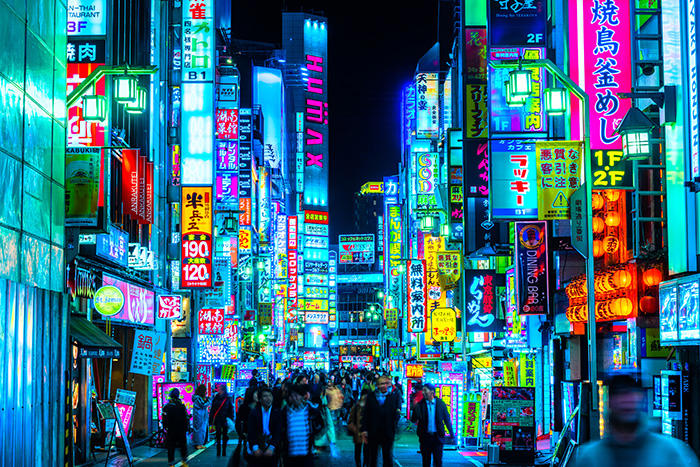
Subscribe Now! Get features like

- Latest News
- Entertainment
- Real Estate
- MI vs DC Live Score
- Election Schedule 2024
- Win iPhone 15
- IPL 2024 Schedule
- IPL Points Table
- IPL Purple Cap
- IPL Orange Cap
- Bihar Board Results
- The Interview
- Web Stories
- Virat Kohli
- Mumbai News
- Bengaluru News
- Daily Digest

Japan introduces e-Visa for Indian tourists: From eligibility criteria to application process, here's a complete guide
Japan has streamlined its visa process for indian travellers with the introduction of evisas. here's your quick guide to the hassle-free application process..
Indian passport holders no longer need to carry a physical visa sticker to travel to Japan. From April 1, Japan began issuing eVisas to Indian travellers. The much-awaited Japan e-Visa programme allows anyone to apply for a visa electronically through Japan Visa Application Centres operated by VFS Global. This programme allows visitors to enter Japan for up to 90 days for tourism purposes.

Under the revised system, applicants must still submit their applications to the Visa Application Centres overseen by VFS Global, which is the same process as before. However, one notable change is in the way visas are issued. Instead of receiving traditional visa stickers affixed to their passports, successful applicants will now receive electronic visas. (Also read: Travelling to the USA for baseball game? Check these 5 best hotels near major league stadiums that can save your money )
The e-Visa process requires travellers to present a 'visa issuance notice' on their mobile device upon arrival at the airport. It's important to note that internet access is required for this process. Any format other than a digital visa issuance notice, including PDFs, photos, screenshots or printed copies, will not be considered valid.
What are the eligibility criteria
Citizens and residents of the following countries and regions are eligible: Brazil, Taiwan, Singapore, United Arab Emirates, South Africa, United Kingdom, Canada, Australia, Cambodia, Saudi Arabia, USA. Additionally, Indian citizens and foreign nationals residing in India are also included in the eligibility criteria. Residents of these countries or regions, with exceptions for those exempt from short-term visas, can apply for an eVisa through the Japan e-Visa website.
How to apply
Here's a step-by-step guide to the application process:
Step 1: To initiate the application process, individuals should access the official website of the Japan Visa Application Centre, managed by VFS Global, by visiting https://visa.vfsglobal.com/ind/en/jpn/.
Step 2: Choose the "Temporary Visitor Visa" option and review all visa requirements carefully. Download the application form, fill it out accurately, and print it. Ensure all fields are completed. Additionally, prepare photocopies of the required documents for the single-entry short-term tourism visa.
Step 3: Schedule an appointment to submit your application at the Visa Application Centre. Once booked, you'll receive a confirmation email for your appointment, which will include the letter of appointment.
Step 4: Submit your completed visa application form at the center during your appointment. Then, wait for an email notification informing you when your decision is ready for collection. You can track the progress of your visa application online using the reference number provided on your invoice or receipt. Approved applicants for the eVisa will receive an electronic visa instead of a physical visa sticker. However, travelers are required to show a "visa issuance notice" on their mobile devices upon arrival at the airport.
Step 5: At the airport check-in, display the "visa issuance notice" on your device. The travel agency will furnish a "Visa Issuance Notice" inclusive of a two-dimensional barcode. Scan the barcode using your device and input the required details to access the notice. Tap "Display" to view the electronic "visa issuance notice."
During the application process, individuals may be required to appear in person at the Japanese overseas establishment with jurisdiction over the applicant's place of residence for an interview.
- Tourist Visa
Join Hindustan Times
Create free account and unlock exciting features like.

- Terms of use
- Privacy policy
- Weather Today
- HT Newsletters
- Subscription
- Print Ad Rates
- Code of Ethics
- Elections 2024
- India vs England
- T20 World Cup 2024 Schedule
- IPL Live Score
- IPL 2024 Auctions
- T20 World Cup 2024
- Cricket Players
- ICC Rankings
- Cricket Schedule
- Other Cities
- Income Tax Calculator
- Budget 2024
- Petrol Prices
- Diesel Prices
- Silver Rate
- Relationships
- Art and Culture
- Telugu Cinema
- Tamil Cinema
- Exam Results
- Competitive Exams
- Board Exams
- BBA Colleges
- Engineering Colleges
- Medical Colleges
- BCA Colleges
- Medical Exams
- Engineering Exams
- Horoscope 2024
- Festive Calendar 2024
- Compatibility Calculator
- The Economist Articles
- Explainer Video
- On The Record
- Vikram Chandra Daily Wrap
- PBKS vs DC Live Score
- KKR vs SRH Live Score
- EPL 2023-24
- ISL 2023-24
- Asian Games 2023
- Public Health
- Economic Policy
- International Affairs
- Climate Change
- Gender Equality
- future tech
- Daily Sudoku
- Daily Crossword
- Daily Word Jumble
- HT Friday Finance
- Explore Hindustan Times
- Privacy Policy
- Terms of Use
- Subscription - Terms of Use
- International
- Today’s Paper
- Premium Stories
- Express Shorts
- Health & Wellness
- Board Exam Results
From Japan’s e-visa to Dubai’s 5-year tourist visa, here are the latest visa updates for Indian travellers
Latest visa news for indians: check out the latest visa updates for indian travellers to ensure a smooth and hassle-free travel experience this summer vacations..
Latest Visa Updates for Indian Tourists: As the summer holiday season is just around the corner, it’s crucial to start planning one’s travel itinerary to ensure a memorable and stress-free vacation. As per the Henley Passport Index 2024 , India is ranked 80th. Indians get visa-free access to 62 countries.
From eVisas introduced by Japan to Dubai’s multiple entry five-year visa, in recent months, there have been new visa regulations in various countries across the globe for India, and being well-versed in the latest visa requirements will ensure a smooth and hassle-free travel experience and making informed decisions.

Here is a complete list of the latest visa updates every Indian traveller should know.
1. japan’s e-visa:.
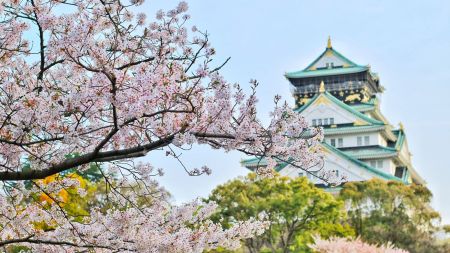
Japan has introduced an eVisa system for Indian travellers, making it easier and more convenient to visit the country. Starting in April, eligible Indian citizens and foreign nationals residing in India can apply for an eVisa for short-term tourism purposes through the application process operated by VFS Global. Now, instead of physical stickers in passports, visas will be issued electronically and would offer a single-entry option, allowing stays up to 90 days.
2. Romania, Bulgaria and Croatia’s Schengen visa:

Becoming the recent EU nations to join Europe’s Schengen travel area, Croatia, Romania and Bulgaria have partially joined the Schengen area, expanding the scope of the Schengen visa to include 29 countries across continental Europe. This means that Indian travellers can now obtain Schengen visas from Romania and Bulgaria, allowing stays of up to 90 days within 180 days.
3. Dubai’s five-year, multiple-entry tourist visa:

Dubai introduced a new visa program tailored to Indian travellers in February, which offers a five-year, multiple-entry option, allowing stays of up to 90 days in the country, with the possibility of a single extension not exceeding 180 days annually, for both business and leisure trips, with unlimited entries and exits within five years.

4. Thailand’s visa-free entry:
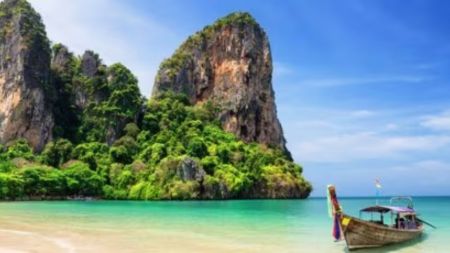
The Thai Government has introduced a temporary visa exemption for Indian passport holders, enabling them to enter Thailand without a tourist visa from November 10, 2023, to May 10, 2024, with an exemption granting a 30-day stay for tourism purposes.
5. Kenya to eliminate visa requirements:

Starting from January 1, 2024, Kenya has abolished visa requirements for Indian citizens and all international tourists, to boost its tourism industry. This decision aims to provide easier access to Kenya’s rich wildlife and beautiful beaches, encouraging more visitors to explore the country’s unique attractions.
- e-Tourist Visa
- Indian passports
- tourist visa

AAP's Sanjay Singh, recently released from Tihar Jail, discussed the party's strategy for the Lok Sabha polls and the INDIA alliance. He addressed the arrest of CM Arvind Kejriwal and the conspiracy against the party, as well as the growing role of Kejriwal's wife. Singh expressed confidence in defeating the BJP and emphasized the importance of a common minimum programme among INDIA parties.
- WWE WrestleMania 40, 2024, Night 1, LIVE: New tag team champions crowned, Jade Cargill wins her debut match at WrestleMania 22 mins ago
- Chess Candidates Tournament 2024 Live Updates: Praggnanandhaa defeats Vidit; Vaishali wins; Gukesh draws 60 mins ago
- Lok Sabha Election Live Updates: After Saharanpur, PM Modi holds mega roadshow in Ghaziabad 13 hours ago
- Delhi News Live Updates: Court extends former deputy CM Manish Sisodia’s judicial custody till April 18 19 hours ago

Best of Express

Buzzing Now

Apr 07: Latest News
- 01 Virat Kohli left to do the heavy lifting again but Jos Buttler finds support act in Sanju Samson as RR keep 100% record
- 02 Kolkata heavyweights Mohd Sporting win I-League; set to join East Bengal, Mohun Bagan in ISL
- 03 3 BMCRI hostellers test positive for cholera, total rises to 10 in Bengaluru
- 04 Man from Bharuch dies 18 days after he was set ablaze at home
- 05 4 years after accused died, lawyer’s request to prove innocence in court denied
- Elections 2024
- Political Pulse
- Entertainment
- Movie Review
- Newsletters
- Gold Rate Today
- Silver Rate Today
- Petrol Rate Today
- Diesel Rate Today
- Web Stories

Sign up for free
Expert consultation.
I accept the Terms & Conditions

Don' know what to do?
Get Free Counseling
Posted on April 03 2024
Japan issues eVisa for Indian travellers. Check requirements and how to apply?

*Planning for overseas immigration ? Talk to Y-Axis, the world’s no. 1 overseas immigration company.
For more updates on Immigration news, follow the Y-Axis news page !
Web Story: Japan issues eVisa for Indian travelers. Check requirements and how to apply.
Immigration news
Japan immigration news
Japan visa news
Migrate to Japan
Japan visa updates
Japan immigration
Overseas Immigration News
Visit Japan
Japan Visit Visa
Options for you by Y-Axis

Get it on your Mobile

Get News Alerts

Contact Y-Axis
Latest Article
Related post, trending article.
Japan expands foreign worker visa program to address driver shortage, aiming to admit 820,000 skilled workers over five years. The initiative includes new regulations and requirements for positions in the transportation and railwa … Read more
Japan expands foreign worker visa program to address driver shortage, aiming to admit 820,000 skilled workers over five years. The initiative includes new regulations and requirements for positions in the transportation and railway sectors. Read less
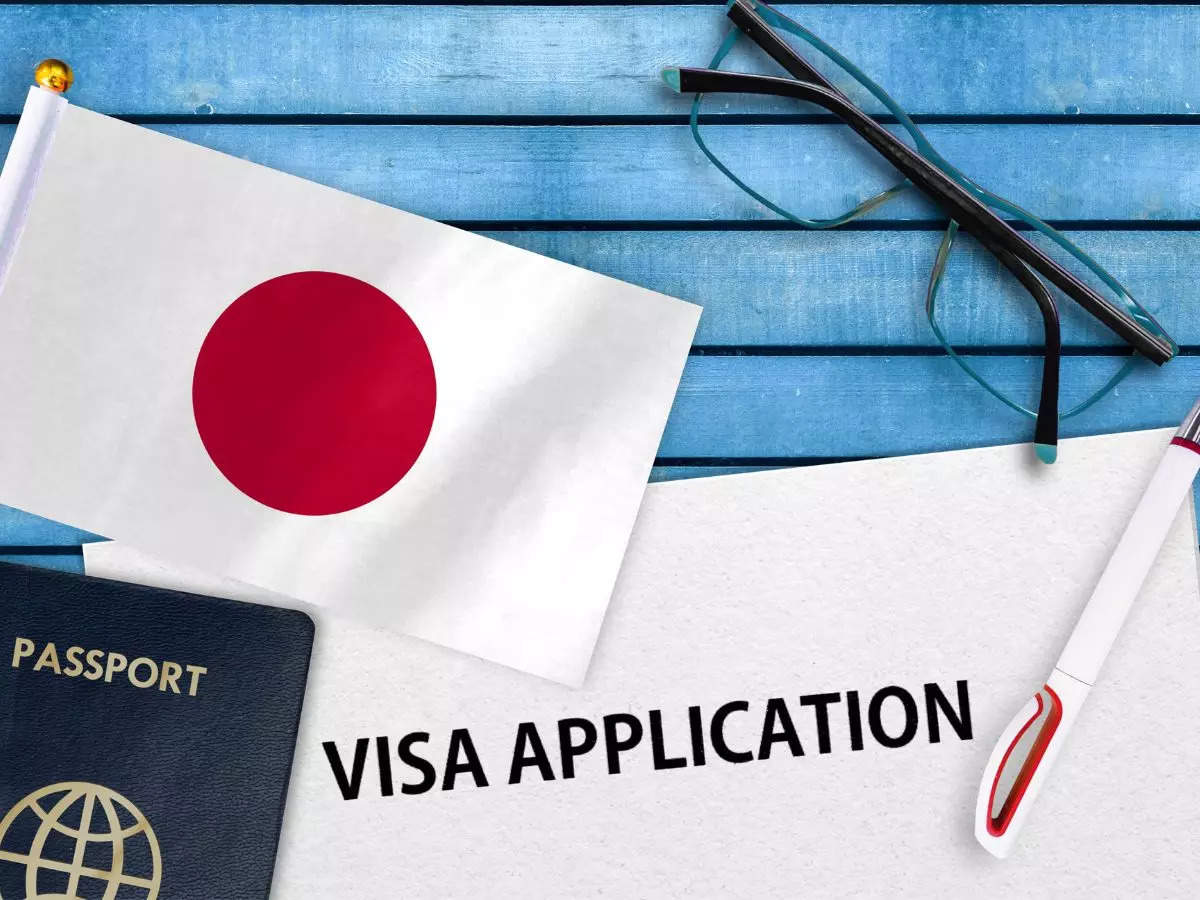
More from Travel News

International destinations you can fly to directly from Mumbai
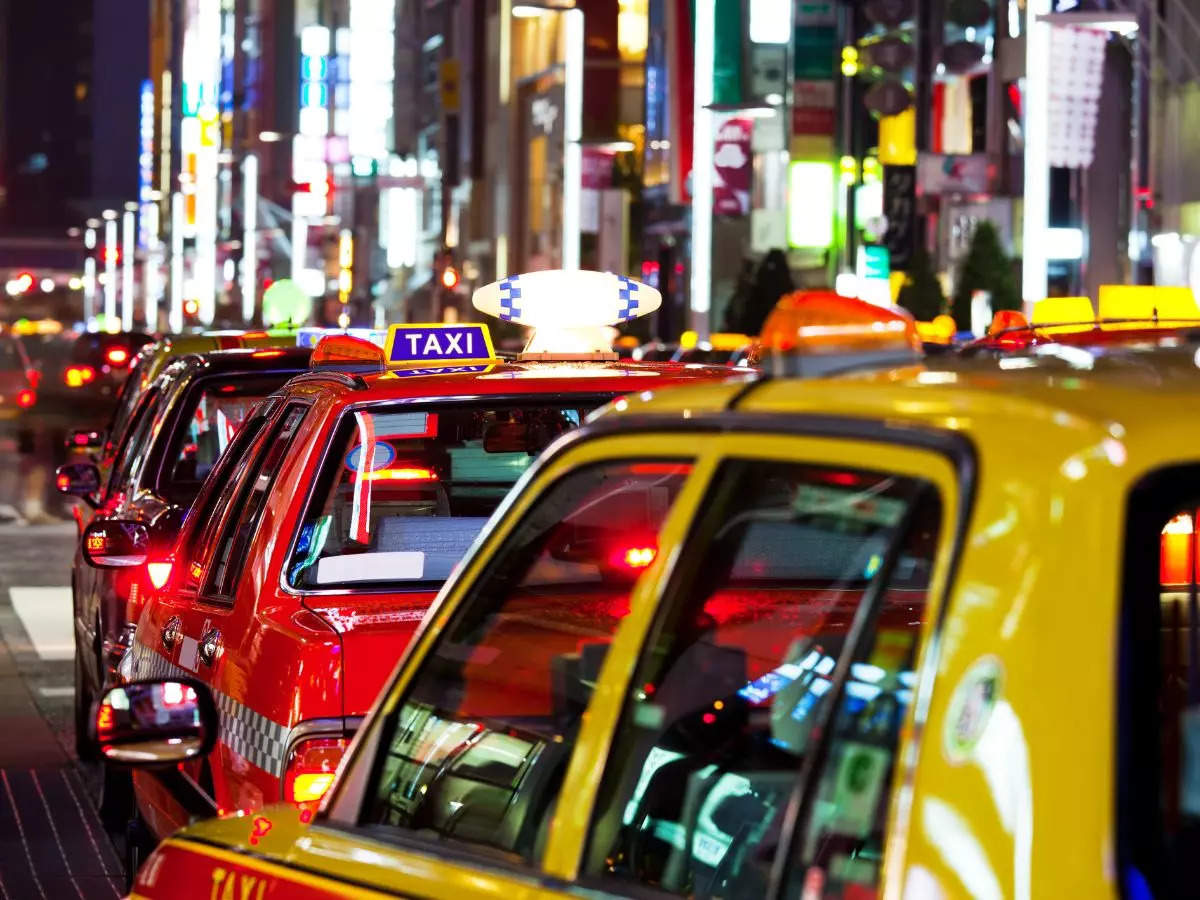
Comments (0)

Refrain from posting comments that are obscene, defamatory or inflammatory, and do not indulge in personal attacks, name calling or inciting hatred against any community. Help us delete comments that do not follow these guidelines by marking them offensive . Let's work together to keep the conversation civil.
Comments ( ) Sort: Newest UpVoted Oldest Discussed Down Voted closecomments

SIGN IN WITH
Or post without registration.

Visual Stories

Popular Galleries

Best summer scenes from Kashmir that inspire travel TRAVEL TRENDS , JAMMU AND KASHMIR

Airports from around the world that are larger than life! TRAVEL TRENDS , WORLD

The best of Delhi's parks for a perfect summer day out TRAVEL TRENDS , DELHI
Trending stories.

- Tamil Nadu: Kanadukathan, where you can stay at centuries-old Chettinad mansions!

- Thailand: Single-visa initiative targets long-haul travellers, promotes seamless ASEAN travel

- Guide to safari in Ranthambore – Gates with maximum tiger sighting

- Tales of Djinns: The alleged haunting of Feroz Shah Kotla Fort in Delhi

- A complete guide to paragliding in Bir Billing, Himachal Pradesh
- 1 Japan broadens its worker visa Programme 2024; plans to invite 820,000 foreigners!
- 2 Leopard enters a house in Delhi, attacks 3 people and causes panic in the area
- 3 Romania and Bulgaria are the newest entrants to Europe’s Schengen travel zone
- 4 American Airlines eases its flying with pets policy; it gets cheaper and hassle-free
- 5 April Fools’ Day: Its origin and countries that actually take pranks seriously!

THE DEFINITIVE GUIDE TO DESTINATIONS, ITINERARIES, THINGS TO DO, RESTAURANTS, NIGHTLIFE and LOTS MORE!
FOLLOW US ON
Places to visit.
- Places to visit in Bangalore
- Places to visit in Mumbai
- Places to visit in Delhi
- Places to visit in Goa
- Hotels in Goa
- Hotels in Jaipur
- Hotels in Shimla
- Hotels in Mumbai
Things To do
- Things to do in Goa
- Things to do in Mumbai
- Things to do in Bangalore
- Things to do in Delhi
Travel Inspiration
- Visa on arrival for Indians
- Honeymoon Places in india
- Hill Stations in India
- Weekend getaways in Mumbai
- Weather in Delhi
- Weather in Chennai
- Weather in Bangalore
- Weather in Mumbai
Best Beaches
- Goa Beaches
- Mumbai Beaches
- Pondicherry Beaches
- Kerala Beaches
- Restaurants in Bangalore
- Restaurants in Chennai
- Restaurants in Pune
- Restaurants in Jaipur
- Hill Station near Delhi
- Winter trip to Ladakh
- Places to visit in Kerala
- Winter Honeymoon Destinations
- UK visa guide for Indians
- Winter Trip to Manali
- Vaishno Devi Yatra
- Special Train Ticket Booking
- HP inter-state Bus
- Honeymoon Destinations India
Latest News
- Assam: This temple has a sacred earthen lamp that has been burning since 1461!
- Tokyo: Cherry blossoms reach full bloom, drawing tourists and locals in large numbers
- Solar Eclipse 2024: When, Where to Watch, Visibility in India, How long it will last, all you need to know about it
- Scientists discover gigantic ocean 700 km beneath the Earth’s surface
- Sachin Tendulkar’s wildlife adventure at Jim Corbett National Park’s Dhikala Zone
Congratulations!
You have been successfully added to the mailing list of Times of India Travel. To complete the subscription process, kindly open your inbox and click on the confirmation link which has been emailed to you.
Share with friends
Thank You for sharing! Your friend will receive the article link on email mentioned.
- (For more than one recipient, type addresses separated by commas)
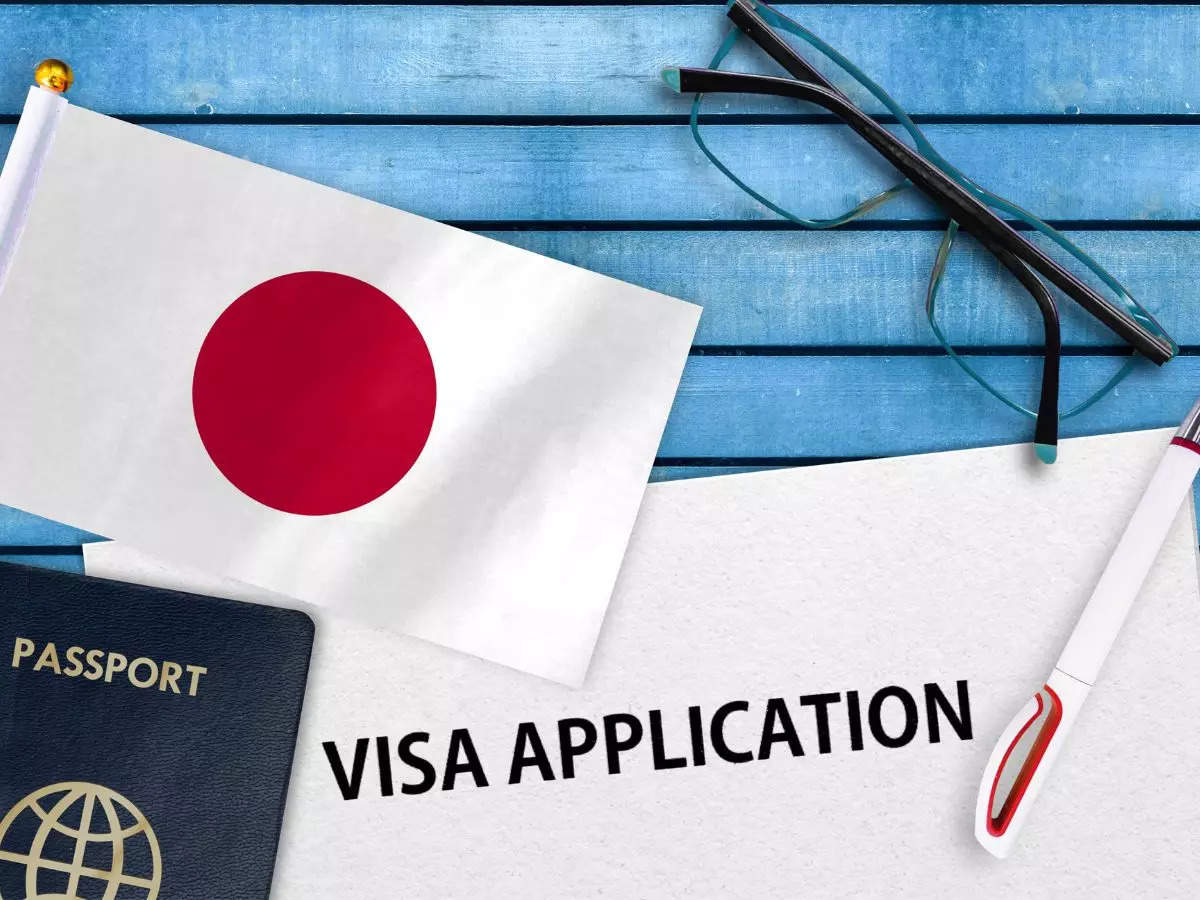
Japan expands foreign worker visa program to address driver shortage, aiming to admit 820,000 skilled workers over five years. The initiative includes new regulations and requirements for positions in...
The Ministry of Foreign Affairs website uses JavaScript. Please turn on "JavaScript" and use it.

General visa: Dependent (family stays)
本ホームページは「JavaScript」が使われております。 「JavaScript」をONにしてご利用ください。
Embassy of Japan in India
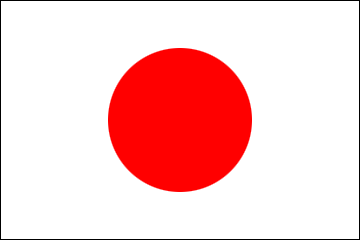
- The Embassy of Japan in India is also accredited to Bhutan .
The JAPAN eVISA system
Back to Top

IMAGES
VIDEO
COMMENTS
Inquiries about Visas Application. Foreign Residents Support Center (FRESC) MOFA Visa Information. Yotsuya Tower 13F, 1-6-1 Yotsuya, Shinjuku-ku, Tokyo, 160-0004 Navi-Dial: 0570-011000. (For some IP phones and calls from overseas, please call +81-3-5369-6577) Monday to Friday, 09:00-17:00.
Prepare all the required documents: Types of Visas & Documents. Visit the Embassy of Japan and submit all the documents: Application Drop-off Hours. Visit the Embassy of Japan to pick up the visa and pay the visa fee: Pick-up/payment Hours & Fees. Check the current border restrictions on entering Japan: Information on Border Measures.
Any foreign visitor entering Japan must have a valid passport for the duration of their stay, and all visitors must comply with the conditions of their visas. See below for information about the current visa requirements for Japan. Visa Information. If you have any further questions, please contact the Japanese embassy or consulate in your ...
Fingerprint/Photo Requirements for Entry to Japan All foreign nationals entering Japan, with the exemption of certain categories listed below, are required to provide fingerprint scans and be photographed at the port of entry. This requirement does not replace any existing visa or passport requirements. Foreign nationals exempt from this new requirement include special permanent residents ...
April 1, 2024. Japanese. Tweet. Foreign nationals/people who wish to travel to Japan for tourism for a short-term period can apply for a visa online and receive an electronic visa (eVISA) through the JAPAN eVISA system. As of April 1, 2024, the JAPAN eVISA system is available for nationals/people residing in the following countries/regions.
Visit the Embassy of Japan website for the most current visa information. There are no COVID-related entry requirements for U.S. citizens. Entry & Exit: You must have a valid passport and an onward/return ticket for tourist/business "visa free" stays of up to 90 days. Your passport must be valid for the entire time you are staying in Japan.
Visitors wishing to do this will need to apply at a regional immigration bureau in Japan before the initial visa expires. If approved, the extension fee is 4,000 yen. For other nationalities, extending a temporary visa is difficult unless you have family or business contacts in Japan who can act as a guarantor on your behalf.
A3: It is a visa that is issued and recorded electronically. If you apply through JAPAN eVISA, an electronic visa (eVISA) will be issued. You will not have a visa sticker in your passport. When checking in at the airport, you will be asked to display a "visa issuance notice" on your device (e.g. smart-phone, tablet) to prove that you have a ...
A single-entry Japanese temporary visitor visa (New design since 2016) A double-entry Japanese transit visa on a Chinese passport (Old design) Visitors to Japan must obtain a visa from one of the Japanese diplomatic missions, unless they come from one of the visa-exempt countries.
A Temporary Visitor Visa is for those who intend to stay in Japan for 90 days or less for such purposes as follows: Sightseeing; sports; visiting relatives, friends, or acquaintances; visiting a sick person; attending a wedding or funeral ceremony; participating in athletic tournaments; contests etc. as an amateur; business purposes (such as market research, business liaison, business ...
Applying for Japan tourist visa at the embassy is usually a 5 step process. Step 1: Gather all the necessary documents. Step 2: Apply in person at the Japanese embassy. Step 3: Remain available to reach - the embassy may request additional documents or an in-person interview.
If you intend to visit Japan for tourism purposes you will likely need a Japan Tourist Visa. Japan is one of the most-visited countries in the world, receiving millions of tourists every year, who travel to see its mix of modernism, culture, history, and nature. ... The Japan Tourist Visa requirements are: Japan Tourist Visa Application Form ...
Most foreigners who want to visit Japan will have to apply for a Japan Visa before they travel. Millions of people visit Japan every year - in fact, only in 2018, Japan received over 30 million tourists. And there is a lot to see in this exciting island nation, which is a perfect blend of […]
Welcome to Japan. The U.S. Embassy and consulates in Japan are pleased to welcome U.S. citizen visitors back to Japan! We encourage you to follow us on Twitter and Facebook ().Travelers should also consider enrolling in the Smart Traveler Enrollment Program.. U.S. military members and family with SOFA status should contact their chain of command directly for guidance and adhere to the ...
Visit Japan Web can be used normally without setting. If you have not selected whether to set up multi-factor authentication, you will need to register when logging in. (1) Setting up Multi ... Enter your intended length of stay in Japan. If VISA details were obtained by linking VISA, the obtained "Intended length of stay in Japan" is displayed ...
Along with the required documents for Japan visa applications, you also need pictures which follow these specifications: Dimensions: 4.5cm x 4.5cm. White background. Taken in the last six months. You must be staring straight ahead, with a neutral facial expression. Your entire face has to be visible.
Foreign visitors who need a visa to travel to Japan must meet the following Japan tourist visa requirements. A valid passport with at least 6 months validity and 2 blank pages. A completed and signed visa application form. A recent photograph, size 4.5 x 4.5 cm, in color and with a white background. An official birth certificate or a certified ...
Currently, all foreign nationals who wish to newly enter Japan need to apply for a visa except for re-entry cases. Meanwhile, the visa exemption measures for passport holders of countries/regions eligible to visa exemption will be resumed from 0:00 am (JST) on October 11, 2022. [For entrants until October 10, 2022]
To successfully apply for a tourist visa for Japan, applicants must meet the following visa requirements: Hold a valid passport with at least 6 months remaining and 2 blank pages. A completed visa application form. Provide a recent color passport photo and a certified copy of your birth certificate.
Valid passport, completed application form, photograph, proof of travel itinerary, financial documents. Visa application process. Submit application form, pay fee, attend interview if required, wait for processing. Visa extensions. Possible, requires application and approval from immigration authorities in Japan.
Visa requirements. If you have a 'British citizen' passport, you can travel to Japan for tourism or business for up to 90 days. You will get a visa in your passport on arrival, and you do not ...
There are two common tourist visas: the single-entry allowing holders to enter Japan once and stay for as long as 90 days, and the multiple entry visa which lets the holder enter the country many ...
Indian passport holders no longer need to carry a physical visa sticker to travel to Japan. From April 1, Japan began issuing eVisas to Indian travellers. The much-awaited Japan e-Visa programme ...
Here is a complete list of the latest visa updates every Indian traveller should know. 1. Japan's e-visa: Japan (Source: Canva Pro) Japan has introduced an eVisa system for Indian travellers, making it easier and more convenient to visit the country. Starting in April, eligible Indian citizens and foreign nationals residing in India can apply for an eVisa for short-term tourism purposes ...
Japan initiated eVisas for Indian tourists, which offers a stay in Japan for up to 90 days. Indians wishing to visit Japan can apply for visas electronically starting April 1, 2024. Individuals can submit their applications to the Visa Application Centres through VFS Global. Applicants must provide a "visa issuance notice" on their phones ...
Japan expands foreign worker visa program to address driver shortage, aiming to admit 820,000 skilled workers over five years. The initiative includes new regulations and requirements for ...
General visa: Dependent (family stays) March 17, 2023. Japanese. Tweet. Period of stay. A term individually designated by the Minister of Justice (5years or less) Necessary documents. Passport. One visa application form (nationals of Russia, CIS countries or Georgia need to submit two visa application forms)
JAPAN eVISA starts in India from 1 April 2024. You can apply for eVISA through Japan Visa Application Centers (VFS Global). Type of VISA: Single entry short term visa for Tourism (up to 90 days) Eligibility: Indian and foreign nationals who resides in India. *Please note that applicants have to submit applications to the Visa Application Centers (VFS Global) as before but receive a visa issued ...